#it sounds more like a John Lennon record than a beatles record
Text
The last Beatles song
Now and then is the Beatles’ official swan song. It was written and sung by John Lennon, but never fully finished. Thanks to AI, the Beatles can reunite once more 40 years later
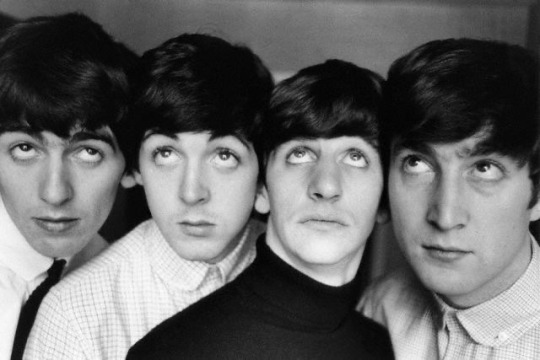
#the beatles#john lennon#paul mccartney#george harrison#ringo starr#blues#classic rock#60s rock#70s rock#Spotify#it sounds more like a John Lennon record than a beatles record#and i have mixed feelings about the AI#but it’s beautiful#mazzy listens
22 notes
·
View notes
Text
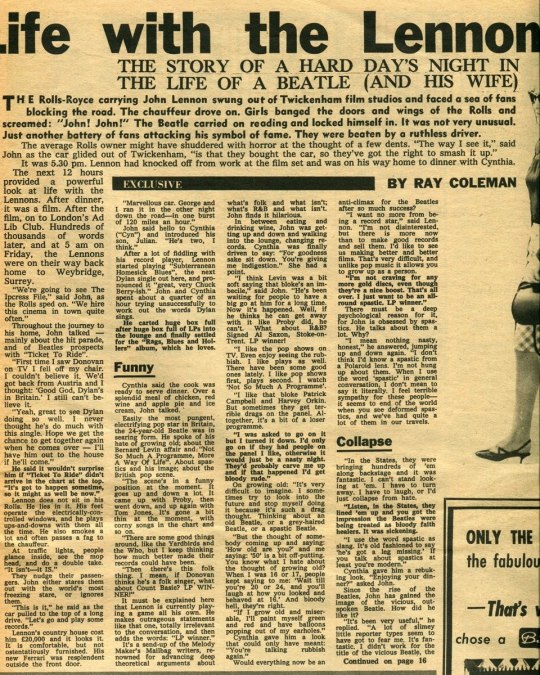

Life With The Lennons, Exclusive by Ray Coleman, April 1965 [x]
#john lennon#cynthia lennon#the beatles#ray coleman#kenwood#1965#wish we had a specific date for this one#given this is around the same time as help! writing and LSD coffee spiking#im not sure ive read another pre-1968 interview that sounds more like bitter 70s john#but some interesting things here#his comments on growing old consider he later called this era his fat elvis period#his game with the press compared to paul#sounding more enthused about films than recording#the guy who told john ab contacts#early glasses johnny#an appearance of nigel the dog#how he uses soft to describe him but then uses it to barrage the idk radio hosts?#i'll follow the sun coming on the radio and the absurdity of saying paul was 10 when he wrote it#(he was 16 at the earliest possibly 17 or 18 and he didnt finish it until he was 22)#they're so weird with referring to their ages in the 60s like j&p just keep saying they met when they were 12#(they were never 12 at the same time so its either shorthand or some absurd joke)#april 1965#john speaks#text scans#ad lib club
42 notes
·
View notes
Text
The »The End« guitar solos
or "how to subtly show your love by playing guitar together, when talking about problems is apparently not a possibility"
Quotes by Geoff Emerick, sound engineer and record producer:
'I know!' he (John) said mischievously, unwilling to let it go. 'Why don't we all play the solo? We can take turns and trade licks.' Long guitar solos with dueling lead guitarists were becoming the vogue at the time, so it was a suggestion that clearly had merit. George (Martin) looked dubious, but Paul not only embraced the idea but upped the ante further still: 'Better yet,' he said, 'why don't all three of us play it live?' Lennon loved the idea – for the first time in weeks I saw a real gleam in his eye. It didn't take long for John's enthusiasm to rub off on George Harrison, who finally got into the spirit of things.
John, Paul and George looked like they had gone back in time, like they were kids again, playing together for the sheer enjoyment of it. More than anything, they reminded me of gunslingers, with their guitars strapped on, looks of steely-eyed resolve, determined to outdo one another. Yet there was no animosity, no tension at all – you could tell they were simply having fun.
The order was Paul first, then George, then John, and they went back and forth. They ran down their ideas a few times and before you knew it, they were ready to go. Their amps were lined up together and we recorded their parts on one track.
You could really see the joy in their faces as they played; it was like they were teenagers again. One take was all we needed. The musical telepathy between them was mind-boggling.
Incredibly, after just a brief period of rehearsal, they nailed it in a single take. When it was over, there was no backslapping or hugging – The Beatles rarely expressed themselves physically like that – but there were lots of broad grins.
I guess there's also the possibility that, as they were performing the solo, they realized they might never get to play together again; perhaps they were viewing that moment as a poignant farewell. It was the first time in a long time that the three of them were actually playing together in the studio.
#sorry ringo#your drum solo is also perfect#but the guitar solo part of the end will always get to me#and in the end the love you take is equal to the love you make#the beatles#paul mccartney#john lennon#george harrison#ringo starr#beatles#abbey road#the end#1969#guitar solo
734 notes
·
View notes
Text
What Happened In India?
(or around that time...)
Before
Shortly before we were due to leave for India John spent the weekend with Derek Taylor, a former journalist who had become the Beatles' press spokesman and a good friend to us all. He, his wife Joan and their five children lived in a big country house where they seemed incredibly contented. When he came home after that weekend John put his arms around me and said, 'Let's have loads more kids, Cyn, and be really happy'
Despite my increasingly strong feeling that John was slipping away from me, it seemed at moments like that as though nothing had changed. John was off drugs and seemed almost like his old self. 'We can make it work, Cyn,' he said. 'When we're in India we'll have time for us and everything will be fine.' I hoped he was right.
John (Cynthia Lennon)
Cyn hoped that Rishikesh would afford seclusion, privacy and an opportunity for her and John to rediscover each other and to revive their marriage.
‘Impossible hopes,’ she said sadly. ‘John said to me just before we went to India that he wanted us to have more children. Well that came out of the blue, I can tell you. I was really surprised, as he’d never said a word about that before.
Lesley-Ann Jones - The Search for John Lennon
Cynthia: “It was a time for us all to drop out for a while. The years of fame and fortune had taken their toll on our nerves and minds. John and I both felt closer. There seemed to be a greater possibility of our finding a solution to personal difficulties. If our trip to India wasn’t going to solve our emotional problems, then nothing would.”
The Beatles Off the Record (Keith Badman)
That letter made it crystal clear that they [John and Yoko] had been in contact. How well had they got to know one another? I tackled John, who told me she'd written many times, both letters and cards, but said, 'She's crackers, just a weirdo artist who wants me to sponsor her. Another nutter wanting money for all that avant-garde bullshit. It's not important.' I had no way of knowing whether he was telling me the truth. He sounded genuine, but a sixth sense told me there was more to this than he was admitting. I tried to put it to the back of my mind. We were going to India, and I wanted that to be a special time for us.
John (Cynthia Lennon)
John panicked at the accumulating threats from the Princess of Darkness. That was when he decided to go to India with Cynthia to put some distance between himself and Yoko. If he stayed away long enough, he could hope Yoko would just go away. Maybe she’d go back to America, or vanish in a puff of smoke. Her scissors act might go horribly wrong, or while she was bagged up one day the Royal Mail might frank the bag and deliver it to anywhere but India. Yes, a long trip to the ashram, where he could meditate and learn how to be calm and in control, give up drugs and spend romantic moments with Cynthia and glue his crumbling marriage back together, seemed opportune.
Magical Mystery Tours My Life with The Beatles by Tony Bramwell
“I don’t like the unhappiness she [Yoko] caused. She was horrible. John wanted to avoid her at first. He said, ‘Get rid of the bloody woman!’ But after India, he saw her differently — perhaps filtered through an exotic mindset.”
Tony Bramwell - the band’s ex-road manager
During
“The pressure of being the Beatles had driven a wedge between them individually and that had all percolated in the months leading up to their visit to Rishikesh,” he said. “Once they got there, and they unburdened themselves from all of that, they reconnected with their songwriting and their creativity. It just flowed forth.”
Bob Spitz to the New York Times
“I was in a room for five days meditating,” said Lennon in The Beatles Anthology. “I wrote hundreds of songs. I couldn’t sleep and I was hallucinating like crazy, having dreams where you could smell. I’d do a few hours and they you’d trip off, three- or four-hour stretches. It was just a way of getting there, and you could go on amazing trips.” Cynthia Lennon said in Bob Spitz’s book The Beatles that for John, nothing else mattered when it came to mediation, adding “John and George were [finally] in their element [at the ashram]. They threw themselves totally into the Maharishi’s teachings, were happy, relaxed and above all found a piece of mind that had been denied them for so long.”
The Beatles in India: 16 Things You Didn’t Know
I was right in the Maharishi’s camp writing “I wanna die” you know. I’m So Tired and Yer Blues where they were pretty sort of realistic, you know, they were about me
Lennon Remembers
Ob-La-Di, Ob-La-Da was born on the steps of one of the low slung cottages where the entourage lived.
One day, remembers Saltzman, he was passing by the cottage when he saw Lennon and McCartney sitting on the front steps and strumming the tune on their acoustic guitars.
He ran back, picked up the camera and took pictures of the two with a pensive-looking Starr sitting on the side, from outside a wicket gate. Saltzman remembers the two were singing the first two lines of the song "over and over again, going fast and slow, having fun". "That's the riff we have," McCartney told Saltzman, "but no words yet".
filmmaker Paul Saltzman
Jenny Boyd, Patti’s sister “I sat with John a lot, since he didn’t feel well, either from terrible jet lag, and insomnia. He would stay up late; unable to sleep, and write the songs that would later appear on The Beatles’ White Album. When I was at my lowest, he made a drawing of a turbaned Sikh genie holding a big snake and intoning, ‘By the power within, and the power without, I cast your tonsil lighthouse out!’ Sometimes, late at night, I can still hear John singing those sad songs he wrote during those evenings, like ‘I’m So Tired.’”
The Beatles Off the Record (Keith Badman)
John “I went to the Maharishi and, regardless of what I was supposed to be doing, I did write some of my best songs while I was there. It was a nice scene. Nice and secure and everybody was always smiling. The experience was worth it if only for the songs that came out. It could have been the desert or Ben Nevis. The funny thing about the Maharishi camp was that, although it was very beautiful and I was meditating about eight hours a day, I was writing the most miserable songs on earth, like ‘I’m So Tired’ and ‘Yer Blues.’”
The Beatles Off the Record (Keith Badman)
Meanwhile, I was not having the second honeymoon I'd hoped for. John was becoming increasingly cold and aloof towards me. He would get up early and leave our room. He spoke to me very little, and after a week or two he announced that he wanted to move into a separate room to give himself more space. From then on he virtually ignored me, both in private and in public. If the others noticed they didn't say so.
I did my best to understand, begging him to explain what was wrong. He fobbed me off, telling me that it was just the effect of the meditation. 'I can't feel normal doing all this stuff,' He said. 'I'm trying to get myself together. It's nothing to do with you. Give me a break.' What I didn't know was that each morning he rushed down to the post office to see if he had a letter from Yoko. She was writing to him almost daily. When I learnt this later I felt very hurt.
John (Cynthia Lennon)
And because the Beatles didn’t know anything about ashrams and they haven’t seen anything before because they went for Maharishi, not for the ashram. Maharishi didn’t allow men to stay with their wives. John was delighted with the idea. He loved it, actually. I think it made Cynthia very unhappy. She wanted to stay with John, everybody had his own problems. My great interest was with John. I was very happy because I found John much healthier. The color in his face was different and he was happier and he took the whole thing very seriously, and he was trying hard and he was so excited when I arrived because perhaps I was part of the reason he was there.
Magic Alex in All You Need Is Love – Peter Brown & Steven Gaines
We all went through a depression after Maharishi and Brian died; it wasn’t really to do with Maharishi, it was just that period. I was really going through the “What’s it all about?” type thing – this songwriting is nothing, it’s pointless, and I’m no good, I’m not talented, and I’m shitty, and I couldn’t do anything but be a Beatle. What am I going to do about it? It lasted nearly two years and I was still in it during Pepper. I know Paul wasn’t at the time; he was feeling full of confidence, and I was going through murder during those periods. I was just about coming out of it around Maharishi, even though Brian had died – that knocked us back again. Well, it knocked me back.
John Lennon, interview w/ Barry Miles, (partially) unpublished. (September 23rd, 1969)
By spending two months in deep meditation in India, John brought his deepest problems to the surface but he was unable to resolve them: the contradiction between his family life and his life as a rock star with all the drugs and groupies was too great. Had he stayed with the Maharishi until the end of the course, he might have avoided some of the pain, but by terminating the instruction abruptly, he was left hanging in thin air. During the weeks at the camp, he had been receiving daily letters from Yoko, though nothing sexual had yet happened between them. He was very attracted by her but he felt tremendous guilt about breaking up his marriage: doing to Julian what his own parents had done to him, repeating the pattern.
Many Years From Now - Barry Miles
He [Mick Jagger] told me with amusement that the real reason why the Beatles left the Maharishi was that he made a pass at one of them: “They’re simple north-country lads; they’re terribly uptight about all that.” Am still not sure if I believe this story.
“The Sixties,” the second volume of Christopher Isherwood’s diaries
After
And I was slowly putting myself together after Maharishi, bit by bit over a two year period. I destroyed me ego and I didn’t believe I could do anything. I let Paul do what he want and say, them all of them do what they want, I was just nothing, I was shit. And then Derek tripped me out at his house after he got back from LA, and he sort of said you’re all right and pointed out which songs I’d written, and ‘you wrote this and you said this, you are intelligent, don’t be frightened’. And then next week I went down with Yoko and tripped out again and she filled me completely to realize I was me and it was alright.
Lennon Remembers
So much had changed since I’d last seen the Beatles just a few months previously. They had come back from their trip to India completely different people. They had once been fastidious and fashionable; now they were scruffy and unkempt. They had once been witty and full of humor; now they were solemn and prickly. They had once been bonded together as lifelong friends; now they resented one another’s company. They had once been lighthearted and fun to be around. Now they were angry.
Here, There and Everywhere - Geoff Emerick, Howard Massey
The rage that was bubbling inside John was the most obvious sign that something was seriously wrong. There was new tension between John and Paul, and even between John and Ringo, in addition to the often strained relationship that Paul had with George and the resentment that Ringo sometimes exhibited when Paul coached him too much on drum parts. In fact, the only two Beatles who seemed to get along during the White Album sessions were John and George. Perhaps that came from the experience they had shared at the ashram—after all, they were the two who had stuck it out, staying on long after Ringo and Paul had gone back home. Maybe they felt deserted by their bandmates, or betrayed. The undercurrents between the four Beatles were so complex at that point, it gave me a headache just thinking about it.
Here, There and Everywhere - Geoff Emerick, Howard Massey
Our first night back in the studio began, as usual, with small talk and catching up. “So how was India?” I asked.
“India was okay, I guess… apart from that nasty little Maharishi,” John replied, venomously.
Harrison looked deflated, as if it were a conversation they’d had many times before. With a deep sigh, he tried to calm his agitated bandmate.
“Oh come on, he wasn’t that bad,” he interjected, earning a withering glance. Lennon’s bitterness and anger seemed almost palpable.
Ringo tried deflecting things with a little humor. “It reminded me of a Butlins holiday camp, only the bloody food wasn’t as good,” he said with a wink.
I glanced in Paul’s direction. He was staring straight ahead, expressionless and weary. He didn’t have much to say about India that day, or any other.
I sensed at that moment that something fundamental in them had changed. They were searching for something, but they didn’t know quite what it was; they had journeyed to India looking for answers, and they were disappointed that they hadn’t found them there… but it seemed to me that they didn’t even know the questions.
Here, There and Everywhere - Geoff Emerick, Howard Massey
“By all accounts, John had hit an all-time low [after India]. “John was in a rage because God had forsaken him,” George recalled. “Then he went and completely reversed himself. He turned from being positive to being totally negative.” According to Pete Shotton, who was spending time with John at Weybridge, there was an overriding feeling of humiliation—from the Maharishi, from the Apple Boutique shambles, from his deteriorating marriage, from what he felt was his shrinking position in the Beatles. “He was more fucked up than I’d even seen him,” Shotton remembers. “It seemed like everything was going to the dogs. He’d been desperately grasping [at] straws, as far as I was concerned, and there wasn’t even a straw there.”
the beatles: the biography, bob spitz
JOHN: How can two women split up four strong men? It’s impossible. You know, The Beatles were disintegrating slowly after Brian Epstein died, it was a slow death, and it was happening. It was evident in Let It Be – uh, although Linda and Yoko were evident then, but they weren’t when it started, I don’t think. It was evident in – in India, when George and I stayed there and Paul and Ringo left.
October, 1971 (St Regis Hotel, New York)
There was little need for me to repeat my instructions. As soon as we got there, it was obvious that things were not hunky-dory with the Beatles. Their recent month-long meditation retreat with the Maharishi didn’t seem to have helped their relationships very much, and the estrangement was definitely having an effect on their work. I don’t think any actual recording got done that night. Paul, George and Ringo were rehearsing some new songs, trying different ways of playing and singing them. Meanwhile, John spent most of his time sitting on the floor next to Yoko, chatting privately with her as she stroked his hair. He seemed no more involved in the proceedings than me and Lawrence, who watched the uncomfortable tension building from the other side of the studio. “Hey John.” Paul turned around to face him at one point. “Are you in this band or what?”
Leslie Cavendish, The Cutting Edge: The Story of the Beatles’ Hairdresser Who Defined an Era
Back at Kenwood John continued to be distant towards me. Now that we were away from the others and the charms of India, I felt increasingly afraid and depressed. John and I were back in the same bed, but the warmth and passion we had shared for so long were absent. John seemed barely to notice me. He was little better with Julian and was more likely to snap at him than give him a hug.
There was just one moment of real warmth between us and that was, ironically, when John confessed to me that he had been unfaithful. We were in the kitchen when he said, out of the blue, 'There have been other women, you know, Cyn.'
John (Cynthia Lennon)
On the flight back from India, he had gotten very drunk and, for some reason, decided to confess all his affairs to Cynthia. Brutally, he ticked off a very long list, which included groupies, models, prostitutes, the wives and girlfriends of his and Cynthia’s friends and, possibly cruelest of all, Cynthia’s own girlfriends. Cynthia felt totally betrayed.
Magical Mystery Tours My Life with The Beatles by Tony Bramwell
The shattering of his faith in the Maharishi, meanwhile, had left John spiritually adrift once more; his instinctive response was to return with a vengeance to his former drug habits. (Like the other Beatles, John had totally abstained from alcohol and drugs while in India.) In retrospect, it's easy to see how wide open John was, at this particular juncture, to anything—or anybody—that might conceivably lift him out of his rut.
The Beatles, Lennon, and me - Pete Shotton
PAUL: I gave myself a set period, and then if it was gonna be something we really had to go back for, I was thinking of going back. But at the end of my month I was quite happy and I thought… this’ll do me. This is fine. If I want to get into it heavy, I can do it anywhere. That’s one of the nice things about it, you don’t have to go to church to do it, you can do it in your own room. So I was quite happy.
RINGO: I left just a little disillusioned, and John was a little disillusioned when he came back, and Paul was. [pause] George just loved it.
1993 rough cut of the Anthology series
Although Paul was the first to leave [India] disillusioned, John left in the mind of, ‘OK, well, we tried, we surrendered to God but it wasn’t God, it was Maharishi and this God thing is proving itself to be a total fallacy’ - and then went back to being The Beatles.
I left Rishikesh with John. Alex [Madras] had been the naughty boy who’d stirred everything up. John went in a rage because God had forsaken him (although it was nothing to do with God, really). Then he went and completely reversed himself. He turned from being positive to being totally negative.
I went to South India […] and everything that happened to me went wrong to the point that I felt, like John and Alex, that the Maharishi had put the heeby-jeebies in me.
George Harrison, c/o Derek Taylor, Fifty Years Adrift. (1984)
JOHN: I’ve got no regrets at all, ‘cause it was a groove and I had some great experiences meditating eight hours a day—some amazing things, some amazing trips— it was great. And I still meditate off and on. George is doing it regularly. And I believe implicitly in the whole bit. It’s just that it’s difficult to continue it. I lost the rosy glasses. And I’m like that. I’m very idealistic. So I can’t really manage my exercises when I’ve lost that. I mean, I don’t want to be a boxer so much. It’s just that a few things happened, or didn’t happen. I don’t know, but something happened. It was sort of like a click and we just left and I don’t know what went on. It’s too near—I don’t really know what happened.
John Lennon, interview w/ Jonathan Cott for Rolling Stone: The first Rolling Stone interview. (November 23rd, 1968)
Cynthia Lennon “John had taken acid once more and enthused, ‘Cyn, it was great. Christ Cyn, we’ve got to have lots more children. We’ve got to have a big family around us.’ At this point, I burst into tears … All I could blurt out was that, in no way, could I see us as he did. I was so disturbed by John’s outburst, that I even suggested that Yoko Ono was the woman for him. John protested at my crazy suggestion and suggested that I was being ridiculous. Although life went on as usual, my fears grew and I felt nervous and depressed. John was aware of my depression and suggested that, as he had to work for long hours in the recording studios for a few weeks, I should accompany Jenny, Donovan, Gyspy and Alexis on a holiday to Greece. The very thought of sun and sea really brightened my outlook.”
The Beatles Off the Record (Keith Badman)
During the spring of 1968, John was as confused, lonely, and unhappy as I'd seen him in years. Though his relationship with the other Beatles was still free of serious strain, he was seeing increasingly less of Paul and George, both of whom were now pursuing independent lives and interests of their own.
In My Life, Pete Shotton
The resentment might have been coming from a different place. With his marital problems still unsettled and Cynthia gallivanting around Greece, drugs continued to govern John’s fitful moods. He dosed himself continuously with LSD, tweaking its random effect with any spare pills he happened to find lying around the house. In the right company, it plunged John into a deep, unfathomable trance that altered between indecipherable rambling and deadpan silences. At Weybridge, into which Pete Shotton had moved in order to keep his friend company, he stayed up nights, tripping and battling wave after wave of incendiary rage. One night, after the usual snack of hallucinogens, Shotton says he noticed John moving his arms around very slowly in a circle. “I said, ‘What are you doing?’ ” recalls Pete, “but John couldn’t explain it. He said, ‘I can’t stop. There’s something making me do this. I can’t help myself.’ ” Tears followed, uncontrollable rivers of tears, intermingled with hideous laughter. When Shotton tried to comfort him, John resisted. “I’m not crying,” he insisted peevishly, wiping his eyes with the back of a hand. Suddenly John declared that he was Jesus Christ, back from the grave. “He was convinced of it,” Pete recalls, “saying… ‘This is it, at last—I know who I am.’ ” The next day the Messiah convened an emergency meeting at Apple to announce his identity to the other Beatles. Unimpressed, they said: “Yeah, all right then. What shall we do now?” After someone suggested lunch, the matter was dropped.
That night at Weybridge, in the middle of another drug-induced reverie, the TV flickered off, whereupon John, already chastened and in a self-abasing mood, asked Pete if it was okay if he invited a woman to the house. Shotton, who had no intention of staying up another night with his friend, was relieved. “Well, I think I’ll call up Yoko,” John said.
The Beatles – Bob Spitz
What happened that night can only be left to the imagination, but since it patently wasn’t the coming together of two virgins for the very first time, did Yoko do her hypnotism thing, as some of John’s friends thought she had, or did she have a powerful new drug in her arsenal? Nobody really believed that John fell in love overnight, because why hadn’t he done so before? He’d been kicking Yoko in and out of his life for over a year. Mostly, he had given the impression that he resented and despised her. So it must have been something pretty potent that made John fall headlong out of his casual affair with her into a mad obsession. Perhaps it was that he really was mentally ill and like many schizoid personalities, got religious mania. If he really did believe that he was Jesus, Yoko would probably have convinced him she was the Virgin Mary. A virgin at any rate. John was shortly to tell the world that they spent the night at the top of the house in his bloodred music room, recording the Two Virgins tape. They say that a moose in heat can waken the dead and achieve the impossible with his bellows. John and Yoko spent the night screaming.
Magical Mystery Tours My Life with The Beatles by Tony Bramwell
Whatever her reasoning, Cynthia remained determined to see the marriage through [after finding John and Yoko together]. Convinced that John still needed her, she returned to Kenwood, mollified by his apparent denial that anything improper had occurred. “For a while, everything was wonderful,” she recalled. “We could speak more openly and honestly with each other, and there really was a glimmer of light at the end of the tunnel.”
But the tunnel was short, and the light soon faded. Within weeks their life together had disintegrated into a revolving state of solicitude and withdrawal, resignation and despondence. Following a stretch when John became disturbingly incommunicative, Cynthia packed once again, escaping on still another vacation to Pesaro, Italy, with her mother, Julian, and a favorite aunt and uncle.
The Beatles – Bob Spitz
No sooner were they back from India, than Jane returned to her work at the Bristol Old Vic, and Paul launched into what was probably the most relaxed time of his life. He opened wide the doors of Cavendish Avenue and the groupies, who had camped as faithfully outside as they had in Wimpole Street during the years that Paul had lived there with the Asher family, were astonished to find they were now invited in. Not only were they invited into the house, but also into Paul’s bed. Whenever I went up to see Paul, the house was filled with giggling, half-naked girls, cooking meals, walking Martha, or glued to the phone for hours on end, calling the world.
Magical Mystery Tours My Life with The Beatles by Tony Bramwell
It came as a welcome relief that John and Paul, along with Neil Aspinall, planned a quick trip to New York on May 11, where several press events had been scheduled to announce Apple Records in the States. Friends agreed that getting John away might do him a world of good; being alone, with just Paul to steady him, might have a calming influence. But Paul was grappling with his own set of anxieties. “We wanted a grand launch,” Paul said, “but I had a strange feeling and was very nervous.” Drugs, he later admitted, may have been at the root of his problem; there was a lot of dope-smoking before takeoff and even during the transatlantic flight. But Jane Asher also helped spike Paul’s mood. The grudging engagement between Beatle and actress had been ticklish at best. But since traveling together in India and a subsequent ten-day trip to Scotland, Jane’s eccentricities rankled. Paul was having serious second thoughts about the relationship, which had reached a kind of critical, now-or-never stage.
Between John’s attitude and Paul’s paranoia, the Beatles were a PR nightmare. “It was a mad, bad week in New York,” recalled Derek Taylor, who met the two Beatles there to chaperone a round of press conferences, followed by interviews. Taylor had fashioned himself into a debonair drug aficionado since the Beatles first dosed him at Brian Epstein’s housewarming party, and now he and John gorged themselves on speed and a “mild and extremely benign hallucinogen” called Purple Holiday, courtesy of their New York chauffeur. The effect of it came through in the interviews. John was gallingly withdrawn and dismissive, Paul unusually distracted—which made them come off as two rich, snooty rock stars peddling another product.
The Beatles – Bob Spitz
+ a couple of extra things
A quick timeline
December 25
Paul and Jane announced that they were engaged to be married.
February 15
George, Patti, John and Cynthia flew from London Airport to India.
February 19
Paul, Jane, Ringo and Maureen flew from London Airport to India.
March 26
Paul, Jane and Neil Aspinall flew back to England from Rishikesh, leaving George and Patti, John and Cynthia and “Magic” Alex who had come out to join them.
April 12
John and Cynthia, George and Patti and “Magic” Alex left in a hurry from Rishikesh, India, after “Magic” Alex convinced John and George that the Maharishi was using his position to gain sexual favours from at least one of the female meditators.
May 11
John and Paul, accompanied by “Magic” Alex, Neil Aspinall, Mal Evans, Ron Kass and Derek Taylor, flew to New York to launch Apple in the US.
May 15
Accompanied by Linda, Nat Weiss drove John, Paul and “Magic” Alex to the airport for their flight back to London.
May 19
With Cynthia taking a short holiday, John called Yoko Ono and invited her out to Kenwood. They made a random sound tape, which was later issued as Two Virgins with the notorious sleeve showing them both naked.
May 26
Cynthia returned home from a brief holiday in Greece, to discover Yoko Ono in residence with John.
May 31
Abbey Road. The White Album sessions. Work continued on ‘Revolution 1’ and the last six minutes was removed to form the basis of the chaotic ‘Revolution 9’. Yoko screamed on the track, her first appearance on a Beatles recording.
June 4
Paul began seeing Francie Schwartz.
June 22-23
On this day Paul McCartney addressed a sales conference attended by executives from Capitol Records, where he announced that all future Beatles records would be released through the group’s Apple Records label. The day after they fell in love in Los Angeles, Paul McCartney and Linda Eastman spent much of the day together at the Beverly Hills Hotel, where he was staying as part of an Apple promotional trip.
July 20
Jane Asher, appearing on Simon Dee’s BBC Television show Dee Time, said that her engagement to Paul was off – but that it was not she that had broken it. She told Dee that they had been engaged for seven months, after knowing each other for five years. (She had arrived back at Cavendish Avenue one day to find Paul in bed with a girl named Francie Schwartz.)
The Beatles Diary Volume 1 The Beatles Years (Barry Miles) & https://www.beatlesbible.com/
A comment from Heydullblog, which I find interesting and think sums up how insufficient & unsatisfying most explanations are for how John changed during this period:
Michael Gerber November 25, 2021 at 4:31 pm
What, in all that, makes you HATE Cyn, and divorce her in the most abrupt and vicious way, even attempting to get her to commit adultery so you can give her (and your own son) as little as possible? Why not a quick and amiable divorce from a woman who, let’s be honest, knew she was getting cheated on pretty constantly since 1961.
What, in all that, makes you HATE Paul McCartney, who has been your closest professional collaborator since 1957, and engage in a five-year campaign to smear and demean him in the press? Why do you insist your millions of fans choose you or him? Why not simply pause the group, and everybody goes solo and remains friends, as was predicted at the end of touring?
What makes you DETERMINED to bust up your rock group, the most popular group in the world, the source of all your fame, money, and power?
What makes you pick Yoko Ono IN PARTICULAR out of all the groupies, hangers-on, and even sensible appropriate partners within your current circle? Eighteen months ago you were attracted to Maureen Cleave, Sonny Freeman, Alma Cogan, etc — pretty much the type of women you always picked — but now, you pick a conceptual artist offering total submersion into someone else’s ego?
And what makes you spend the rest of your life pretending all this was the greatest thing ever, the fullest flowering of your genius?
It’s not that John Lennon looked around at his life in early 1968 and thought, “I don’t want this anymore. This isn’t for me.” It’s that he lashed out incredibly fiercely, in every direction, made no distinction between friend and foe, demonstrated a huge amount of resentment and bitterness towards the very people who it would seem had helped him the most, and spent literally the rest of his short life at least arguably LESS happy than he’d been before. He didn’t dump his wife for the nanny and live happily ever after; he started a process of picking things up and throwing them away with great force that, if he’d been that way in 1957, would’ve kept any of his genius from ever emerging.
He changed, fundamentally, in a short time. Why?
Midlife crises happen, they are to be expected, but this one gets more singular the more you look at it. And the thing about post-India Lennon is how he’s no more happy, no more productive, no more self-aware, no more comfortable in his own skin, than pre-India Lennon. What does the guy in August 1980 have to be angry about? Really? It was only after I reached middle-age and went through my own version of crisis (crises) that I thought, “How strange.”
#the beatles#john lennon#paul mccartney#george harrison#ringo starr#mclennon#there are probably a million posts on this topic but the completionist in me had to do one too
207 notes
·
View notes
Text
Understanding Lennon McCartney Rewatch Part 3.1
I thank my lucky stars every night that Yoko eventually got sick of playing secret-keeper.
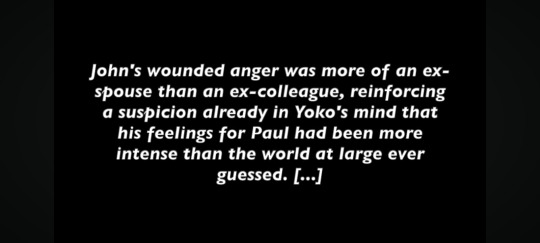

Paul: I didn't leave the Beatles. The Beatles have left the Beatles . . . John said he wanted a divorce. Alright, so do I. See how they say “Beatles” and they mean each other sometimes?
Derek Taylor on John's position on the break-up: if Paul were to approach him and say “let's do it together again” he probably would; with no more words, he would probably do it. Which is an insane claim to make to a world full of people grieving the greatest band to ever exist unless you are very very sure of that probability. But if it's true that that's all it would have taken, and Paul didn't do it? That hurts my head a little. Do we think he was just hurt too bad to want it back? Do we think he didn't know he had that kind of power? Do we think he was glad to be free of the group?
Ugh my heart can't take it. I'd cry too, John, watching that. I mean look at how they are looking at each other. Look at everything they've lost in a year. I'd bawl like a baby too.
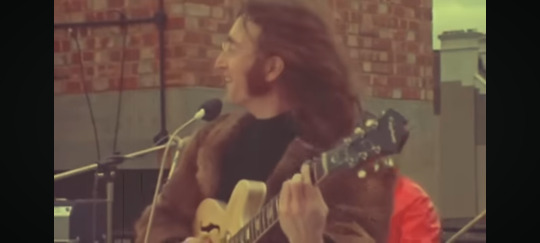

Paul sends John a long, thorough letter, begging for them to legally end their partnership outside of a court. John's run out of cards at this point, but he still doesn't want to lose Paul, so he's just going to play dumb.
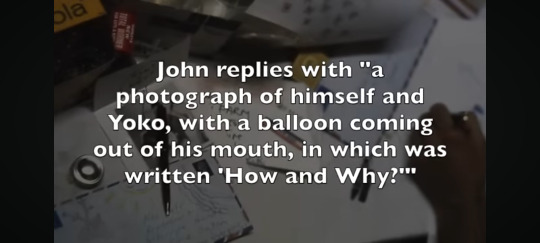
This is how bad he doesn't want to lose him, actually: he goes along with Klein in tricking Paul this time. Calls him up and asks him to come to the studio for a jam session, because it'll hurt his case in court. But for multiple reasons – the Eastmans were knowledgeable lawyers, and Paul might not have even wanted to be in a room with John at the time anyway – Paul doesn't come. Which John would've been hurt and angry over, no matter his motives.
"They tell you to stop crying at about age twelve. Be a man. What the hell's that?" I'm so proud of John for his (albeit long and backsliding) journey out of his toxic masculinity and violence. Something I honestly don't see him achieving without Yoko.
And from that quote it transitions to Paul in Scotland, looking like the embodiment of depression, as the opening of “Isolation” plays. It's perfect.
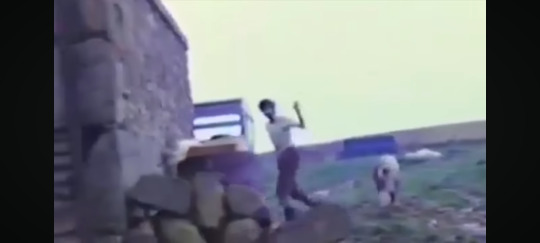
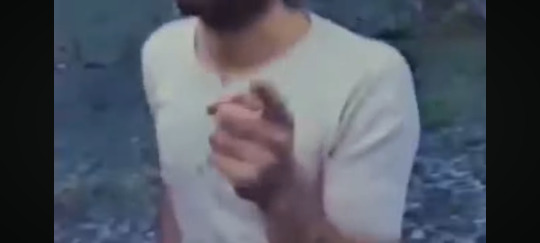
“And don't try to come over here. Or you might get in some trouble.” The way he just froze when he saw them filming him and then the next thing we see is him threatening them? Get ‘em, babe!
John sounds so giddy about this one-upping competition with Paul. I'll scare him and then he'll scare me!
The whole Lennon Remembers era is such a terrible case of diarrhea of the mouth in general, but the amount of homophobic language is quite striking compared to how John talked before and after.
John, talking about George in Rolling Stone: "he was working with two fucking brilliant songwriters and he learned a lot from us." People read that quote and just parrot it like they do with everything John said in this period and act like George had nothing to be angry over. He had every right to be much angrier and hold a much bigger grudge than he did.

And about George's new record, which was phenomenal and brilliant, John is transparently jealous and so cruel. If he'd said that about me and then asked me to play on his new record I'd tell him to go to hell. Why did George do it?

See and everyone who knows John knows how much he loved Brian and to hear him speaking so crassly and cruelly about Brian must've been a sure indication to them to just take the entire interview through that lense of “oh he's just saying shit”. But that's only the people who knew him. Everyone else for the rest of time took this shit as constitutional. And it pisses me off. It should be locked away in a vault somewhere and no one is allowed to listen to it until they've passed some kind of Beatles and emotional intelligence tests.
This crushes my soul. How warped must his definition of love have been by that point that he genuinely believed Phil Spector and Allen Klein loved him more than Paul and George did? It's bonkers.
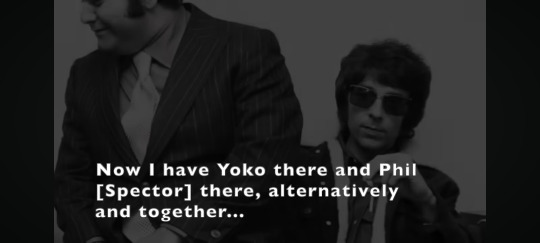
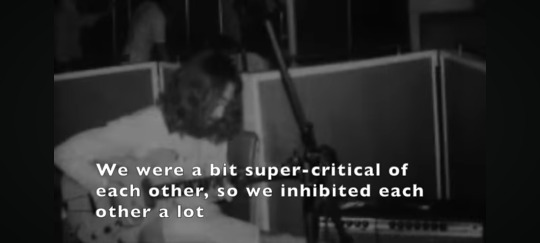
John in 1967: all you need is love! John in 1971: the point of life is to manipulate people. . . . What the hell happened to you, buddy?
I go back and forth as to who's the smarter PR person: John or Yoko? Because maybe she's right. Maybe they shouldn't divulge that they're master manipulators. But is this one of those times when it's good to be all “look how honest we are about this! We're not hiding anything! We're saying bad things about ourselves too! So you should believe us about everything else!”
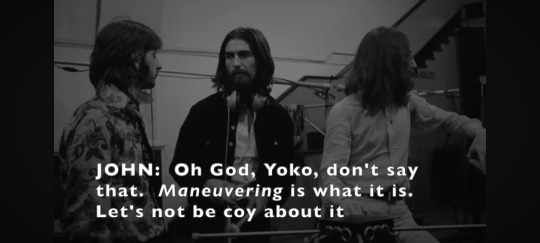
Really this documentarian should be hired to make all the music videos for all the Beatles and solo songs. This one for “Too Many People” is perfect. Paul walking into court with a full beard and a confident stride, John and Yoko in bed, Paul horse riding overlayed on Linda's gorgeous face like she's some goddess, designing his fate. All of it is just pure brilliance.
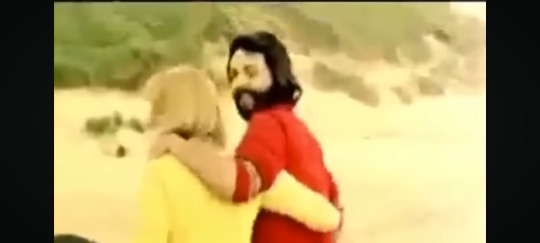
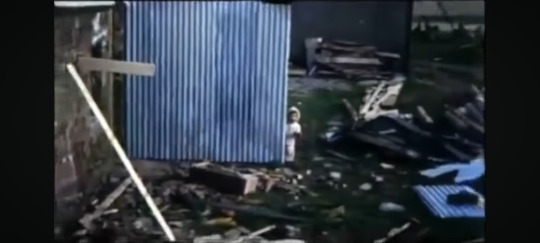
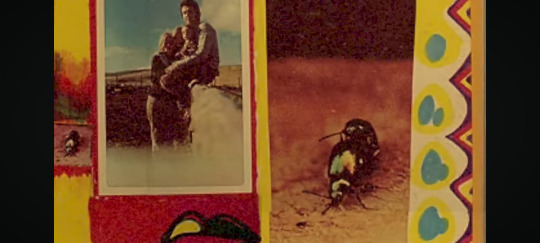

I'm forever laughing at just the title of the song, too. Because to John and Yoko it was so important that they were Weird and Off-putting. Different. Revolutionary. And to say “no. You're not special. There's actually an excess of people like you.” Is so funny to me.
“When she wants an A side, that's when we start fighting.” Oh gosh. Remember how I said he backslides a lot in his feminism journey? Yeah…
Insanity quote Hall of Fame. Yeah, I know he meant to say it's weird to be best friends with a woman. But it sounds like he's saying it's weird to fuck a woman. Which maybe he subconsciously means both idk.
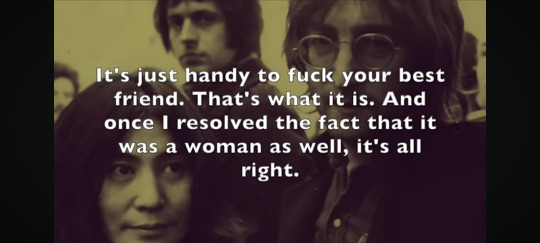
Paul: we need to legally dissolve the partnership because it's the only way we're attached anymore. Ouch. Okay it's true. It's deserved. But that must've stung for the guy who was terrified of losing people. Must've sent him into fight or flight.
I think the point of this framing is to say that if they'd had facetime back then, instead of just crackly phone lines, HDYS would not have been written. Not with those puppy eyes staring him down like that.
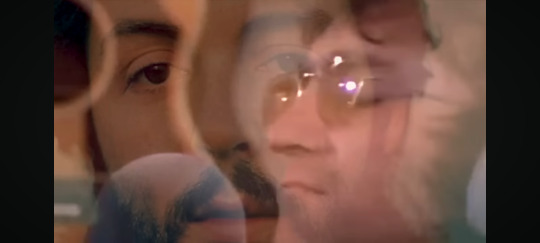
Interviewer: the song wasn't even funny though. John: well I think it's hilarious. Interviewer: hmm. Lol I love hearing interviewers talk to John about his lyrics like he's a real guy doing a real job, though. Imagine a music critic now saying John Lennon wasn't clever in his lyrics. You can't, yeah. Me either.
What a slap in the face to Cynthia. Guess she wasn't Cool Girl enough. Should've gone girled him. That would be an excellent fic. Cyn and Jane gone girl their idiot bfs and John and Paul realize they're in love on death row. But anyway, yeah. If Paul would've just pet John's head . . .
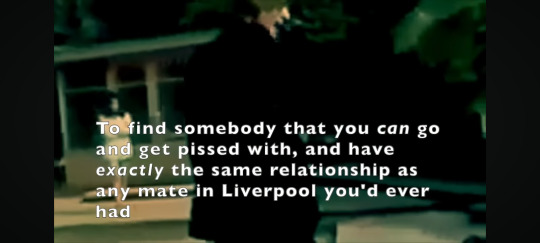
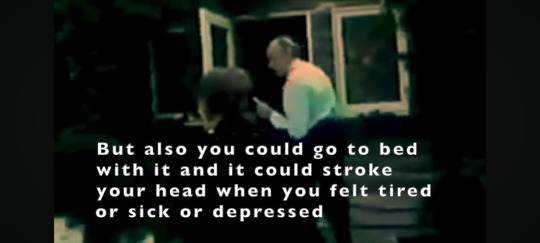
Another absolutely bonkers thing to say. That's something the Rockstar’s ex wife says in a documentary ten years after he's dead, not something a songwriting partner says, completely unprompted, in an exiting the band interview.

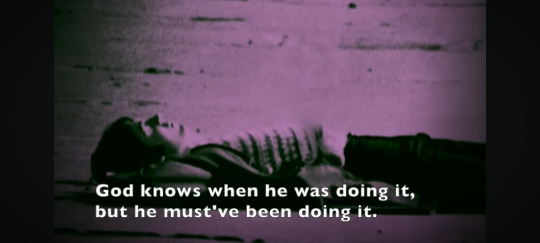
And then he goes off on what I see as a self-soothing diatribe on Paul the family man. You can see the hoops he jumped through to get himself there. What did Paul want that I couldn't give him? A family. And is that justified? Absolutely not, only pussies and conservatives want families.
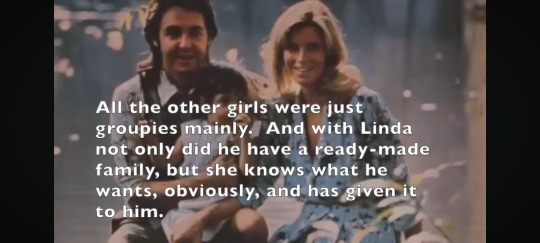
Allan Klein: were you and Paul ever really close, then? John: no. John: not that I didn't love him. I did. It's just that every time I let my guard down, he hurt me. Holy shit. At this point, after getting hit in the face with so much of John's Paul-made pain with nothing from the other side but pictures of the happy McCartney family, I'm genuinely feeling quite angry at Paul. Me. An extremely biased Paul girl who knows it's far more complicated and multi-dimensional than this. No wonder the uninformed public fucking hated his guts.
And as they're showing this quote, “I didn't want to hurt you,” plays mournfully in the background. They really are so twisted up in each other there's no separating individual identities.
Okay so he's a psychopath. So what? He's the sexiest man that ever was or ever will be. He's allowed to be a horrible person. No, but really. He's Get Back Paul but healthier. He's done with his depression drinking and he's been spending a lot of time proving he's still useful enough to exist by building fences and shearing sheep.


And this is how Paul talks about George to interviews. John said Klein made ATMP a success but Paul disagrees. "George recorded it all, wrote it all, did it all, wasn't anything to do with [Klein]. It was George's victory, wasn't it?" Compare that to how John does it and tell me again why the hell George is Team John?
What is Paul's obsession with daddies? Actually I know exactly what the obsession with daddies comes from, but we won't get into that here. I do find it interesting that in ‘69 he's saying “we do need a sort of central daddy figure.” And in ‘71 he's deriding John needing one and won't let John's daddy of choice touch him with a hundred foot pole.
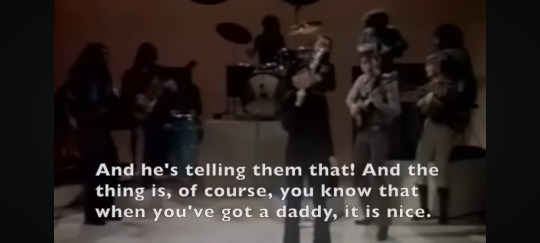
I tend to think Paul chafes against authority in general, but that's actually not right. He never had a problem with George Martin. I think it's just abusive authority or authority he doesn't trust yet.
#paul mccartney#the beatles#john lennon#mclennon#ringo starr#george harrison#yoko ono#linda eastman#understanding lennon mccartney#ulm
130 notes
·
View notes
Note
hi sorry but do you have any soft mclennon moments to share too :') the post you made about 22 seconds of longing hurt oh my god
Sorry for the delay in reply anon. I'm actually just a corporate collar acting my way as a temporary secretary every hard day's night, jobbing like a dog, 8 days a week in an English garden to afford a tan in the rain.
Hope this finds you well! Here are 22 McLennon moments as compensation for Johnny's 22 agonizing seconds in the pining video.
1.) "I'm Happy Just to Dance with You" scene when they both looked at each other at the same time. And the director had to pan out the scene because it would've been too straight. I know dilated pupils when I see it.
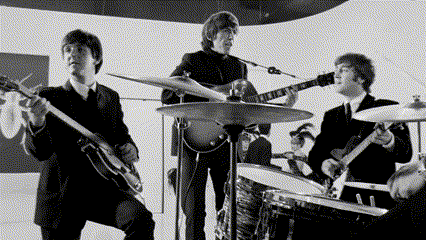
2.) Inviting your favorite boy to a solo trip to Spain but you stayed in Paris because it was so romantic, sharing a bed, picking out clothes for each other, slurping all the banana shakes, you know normal roommate things according to historians.
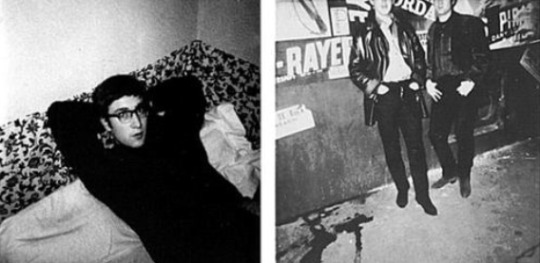
3.) Getting a solo invitation from a hot photographer and bringing along your best boy because you are attached to the hip and can't be separated.
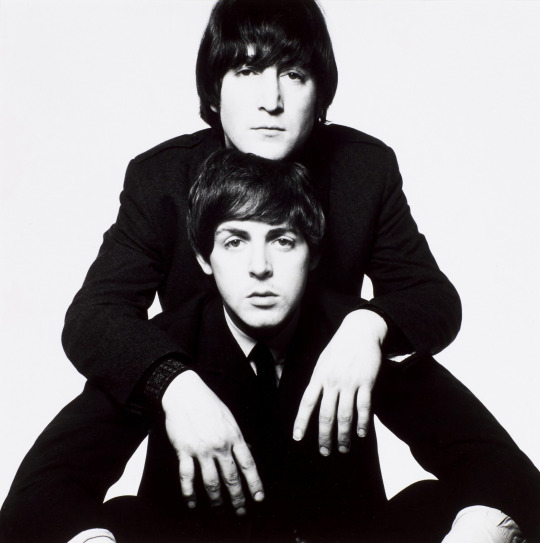
4.) Their need to constantly touch each other

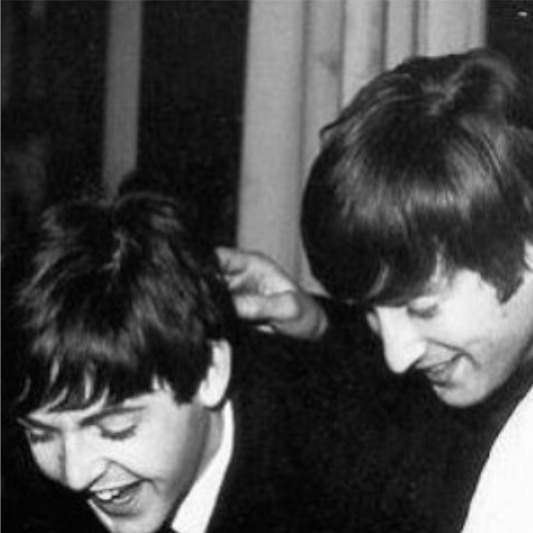
5.) Scene in Help (1965), where John is using all his strength to carry George and Ringo's weight and not crush Paul (because boyfriend things)
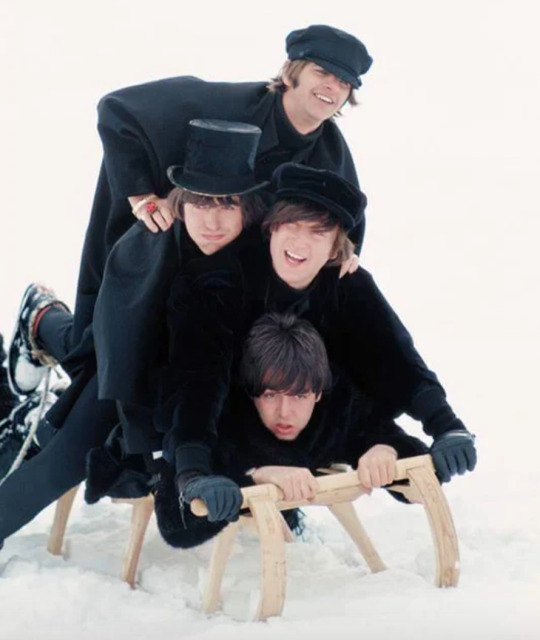
6.) Holding hands for mental support during a recording. (John is needy, please forgive him)
7.) Walking Martha like a couple in 1967 - outfits coordinated and all

8.) Impressions by people who met them:
"[John and Paul] sort of had their own way of communicating. Hardly anything was spoken, they just knew what the other wanted or was getting at and they had the most amazing talent."
"He was like a different animal with Lennon. When they were together they became something else, more than just the two of them together. That communication was incredible. It was like two high-speed computers just fizzing between each other."
9.) John is hiding his cigarette behind him, because he doesn't want to bother Paul with the smoke. (You know, boyfriend things).
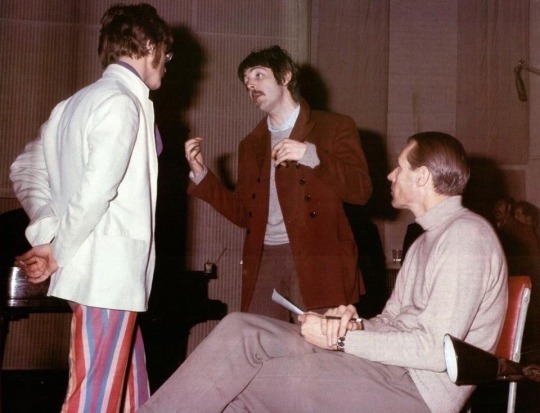
10.) A portrait, king and princess up front. John's thigh just casually resting on Paul's (yet again).
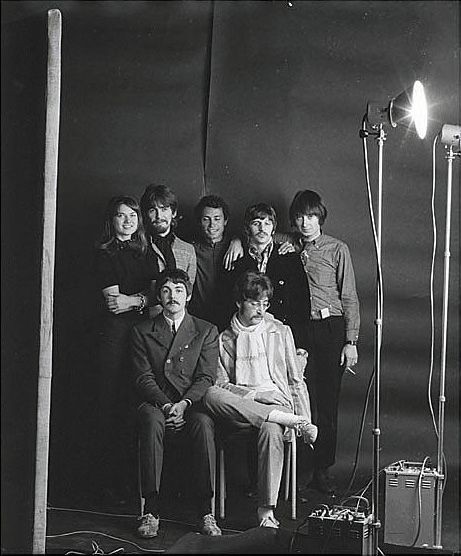
11.) The spider fingers during a press conference, because they are actually both 12

12.) That very flirty jam session in Austria in 1965 that was cut short, but they probably continued after anyway

13.) The way they talk about the day they met sounds like "how I met the love of my life" Happy Honeymoon <3
14.) Quote from Emerick
The lights in the studio were turned off to set the mood; the sole source of illumination was a table lamp next to the wall. The two beatles, lifelong friends and collaborators, sat on high stools, facing each other, studying each other’s lips intently for phrasing.
15.) When they answer each other's songs
Paul in Can't Buy Me Love: "If it makes you feel alright?"
John: "I Feel Fine"
17.) “I could even hear what they were saying off-mike; ‘Oh Paul, you’re so cute tonight’ was met with the reply, ‘Sod off, Lennon.’”
— Joan Baez on accompanying the Beatles to their concert in Red Rocks Amphitheatre, Denver. 26 August 1964
18.) Paul looking at John like he wants to eat him later after finishing with "I'm a Loser"

19.) Giving instructions on how John's hair needs to "look"

20.) Paul acting as John's walking stick
21.) Paul's heart eyes during this 1966 conference (also that lip bite... eat you later?):

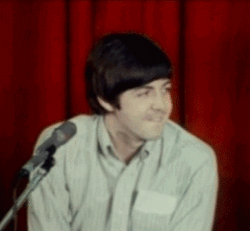
22.) John the worried boyfriend who checks on Paul in the middle of an interview and doesn't believe him when he just says : "oh, yeah..."
John internally: "come on now, why aren't you laughing at my joke babe? You're unwell!!!"
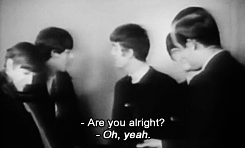
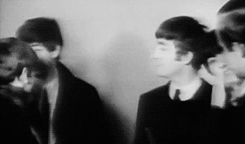
The Bottles over and out.
Thank you for this ask. This was quite fun! Would love to hear your thoughts too <3
201 notes
·
View notes
Text
the beatles bad impressions hc's
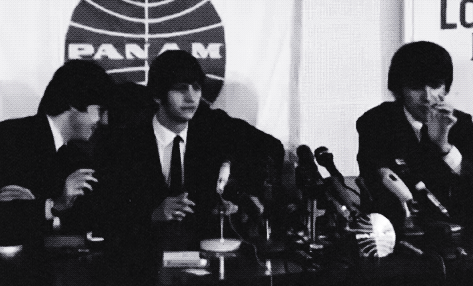
how the boys would leave a less than perfect impression and what they would do to make it up to you.
john lennon
john would come off as a pretentious dick at first. like the first thing he'd ask you is your music taste and start listening all the obscure jazz bands he knows. and then he's asking if you own a record player and ranting to you about how much better music sounds on vinyl.
it's love at first sight for him, though he doesn't realise it just yet, in that he feels like he can open up to you completely. whether he meets you on a bus, in a museum, at a concert, or wherever it may be he will just spill completely onto you.
you try to avoid talking to him for a while because it's pretty overwhelming having a stranger, however charming, just start talking about music or art or literature.
so when he can finally see you again, after he's realised what he's done, he apologises. verbally and with flowers. then he shuts up and lets you talk about what you like.
paul macca
paul would be weirdly controlling. like you would meet at a cafe and he would insist you order his favourite drink, or you'd be at a library and he'd take the book you were about to borrow out of your hands and replace it with something he enjoyed reading. he thinks he's being really suave and romantic but it's a little creepy.
you either walk away or try to awkwardly take back control of the situation. you kind of see what he's getting at but you're still a little wary of the strange man who got you to order a sad cappucino.
he apologises with a heart to heart where he explains that he's attracted to you and he made the wrong call thinking it would be more charming than scary.
george harrison
george would be very quiet and you would think he hates you at first. he's also quite standoffish and can be blunt or just give super short answers. he loves to start conversations but he either doesn't finish them or makes them so awkward that you end them for your own sake.
this makes you very hesitant to interact with him because you're not sure if he actually dislikes you or if he's fucking with you. overall a very unpleasant confusion.
eventually you confront him and he has no idea he's been coming off that way. he's extremely apologetic and lets it slip how much he actually likes you, and is starting to love you. from then on he makes sure you know just how much he appreciates you.
ringo starr
when you first meet ringo and he's so flirtatious and affectionate and showering you with love, you feel so special and excited inside. but then you see how he acts with everyone else and the joy sort of melts away. seeing him be even more passionate with strangers makes you feel quite foolish.
you go very quiet and try to keep to yourself around him, giving one word answers, prematurely ending conversations, etc. you know you're probably overreacting a little bit but you comfort your choices by reminding yourself that he's literally a celebrity and meets thousands of people just like you.
he's starting his whole flirty bastard routine when you just shut down and he also gets really sad. he tells you that even though he treats everyone this way, he also really cares about you and enjoys your company. he tones it down in the future.
#the beatles x reader#john lennon x reader#paul mccartney x reader#george harrison x reader#ringo starr x reader
147 notes
·
View notes
Text
Eras: The Beatles | Episode 6 - Now and Then
In the final episode of Eras: The Beatles, we hear the story behind The Beatles' final single Now and Then, including new interviews with Paul McCartney and Ringo Starr.
Narrated by Martin Freeman, the episode also features insight on the new track from Sean Ono Lennon, Olivia Harrison and Peter Jackson.
.
[This episode features more complete audio from the soundbites included in the 'Now and Then' short film/documentary. Under the cut are transcriptions of some of my favorite sections. Including Paul's interpretation of the meaning of 'Now and Then' (bonus points if you guess his answer!)]
PAUL: And then 'Now and Then' just kind of languished in a cupboard and we didn't do anything with it. I kept saying, "You know, maybe we should do something with this, seems a bit—" "Hm, I don't know..." There wasn't a great desire to do anything with it. So it hung around for a while. Years! And every so often, I'd kind of go to the cupboard and think, "There's a new song in there! We should do it! We gotta do it!" But it'd go back in the cupboard.
[...]
PAUL: Peter [Jackson] had sent me a text while he was doing the 'Get Back' thing. He said, "Here's a piece of dialogue of John's that I'd like to use, but George is rehearsing in the background," and you could hear George's guitar and you couldn't really make out quite what John was saying because it was distracting. He said, "But we've got this new technology: Machine Assisted Learning. M.A.L., so we're calling it MAL." Which was like— that was really cool! Because our old road manager and dear friend was Mal [Evans].
[...]
PETER JACKSON: I'd had this idea for two or three years about him [Paul] singing a duet with John. And the fact that we'd developed this software now allows us to separate the voices and the music meant that I could take a song that John and Paul were singing on, just separate John's vocal only, and Paul could have that for playing on stage. And then his band and himself could do the vocals and the playing for the rest of the song. So he could do a duet with John. He didn't even blink, he just said, "That's a fantastic idea, I love it! Let's do it!" And so we quickly turned that around and got that underway. So Paul was now touring with a John Lennon duet on 'I Got a Feeling'.
[...]
PETER JACKSON: I got a phone call from Paul saying, "Is it possible to use that technology for another project I've been thinking about? [...] Would it be possible to take John's vocal and clean it up and get rid of everything else? Because that would allow us to finish this Beatles song." And absolutely, it didn't take me more than about a second to get back to him and say, "Of course we can do it!"
[...]
PETER JACKSON: We assumed that the copy of 'Now and Then' that they were working to in the studio in 1995, where the vocals were coming from, was probably not a first-generation copy. [...] So we though, well this is probably a third generation [tape copy]. [...] And so we contacted Sean Lennon and he was very helpful. And sure enough, we got a digital copy of the original. Which is the same demo, same performance, but two generations better.
[...]
RINGO: I'm sitting there thinking, "I don't remember George doing that solo?" It was just like practicing, maybe. Cus it sounds like George! Then Paul said, "No, it's me." [laughs] But Paul did a great job. I mean, he's very good, you know, Paul. He's a very good musician.
[...]
RINGO: Giles [Martin] had to fly out to LA one day to listen to a four-hour string session that Paul wanted, and then fly back to England! [laughs] There's no string sections in England!
[...]
PAUL: Eventually, when we got to mix number 7 it was, "Wow, this is it! Now it's a Beatle record!" And we played it to various people, some of whom cried. Some of whom said, "Jesus Christ! It's a Beatles record!" But the reaction was very favorable.
[...]
RINGO: The difference from the two tracks of John, the old track of John— you know, we have to thank Sean as well, because he found the original tape. So that's the one you can really hear John, not the copy-copy-copies. And... it's like John's there, you know. It's far out. It's so clear now you know it's him. Cus on the original one we were working to I couldn't tell if it was Paul or John singing half the time. But now you know it's John! [chuckles]
[...]
PAUL: I think it just means 'now and then'. "Now and then, I have a cup of tea". I'm not sure it means an awful lot more than that. But, looking at it from today's perspective, now and then. Then you can start to get all sorts of meanings in. The modern-day, the historical past of the Beatles. It lines up with all of that. But we were always very happy to let people make their own minds up. "Here it is, it's a song. Now, the minute we deliver it to you, it's up to you. You can do anything you want with it." And people do!
[...]
RINGO: And that was what it was like for the three of us when we started this role in the 90s. We had to pretend— it always makes me laugh when I think of it— we had to pretend that he'd gone for a cup of tea or his lunch. But that he was still around. Because it was very strange when we started there's only three of us, after all those years, and all that life, that there were four of us. And I still miss him, man!
[...]
SEAN LENNON: It feels very synchronous that the lyric speaks about time and that it's taken so much time. That it sort of fuses the past and the present. It's like a time capsule. And it all feels very meant to be — or fated, or something — in the nicest sense.
[...]
PAUL: When I remember the Beatles, I remember the joy, the talent, the humor, the love. And I think, if people remembered us for that — for those things — I'd be very happy.
#(the fact that I'm back to spending +2h transcribing audio from these guys is a pretty good indication I'm back in the throws of Beatlemania#The Beatles#John Lennon#Paul McCartney#Ringo Starr#George Harrison#Now and Then#Peter Jackson#Sean Ono Lennon#Mal Evans#the person i actually picked as my partner#solo#2023#my stuff#audio
107 notes
·
View notes
Text
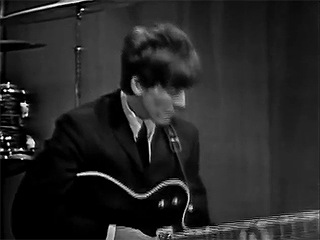
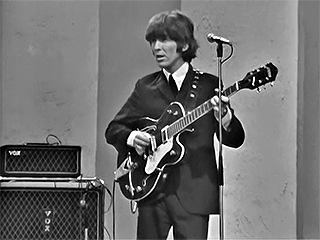
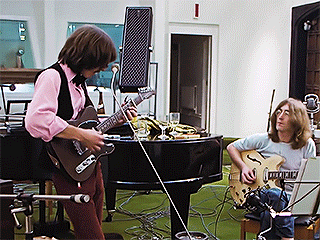
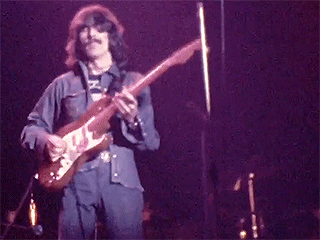
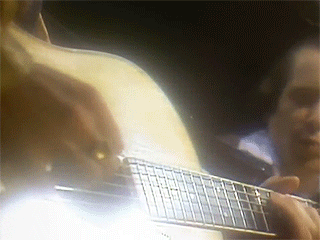
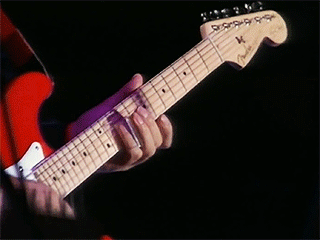
Happy belated 80th birthday to my favourite guitar player. <3
A sequel to this post.
George Harrison: You need Eric Clapton.
John Lennon: No, you need George Harrison.
"He showed me a lot of things on the guitar. George was a really great guitar player. He just didn't think he was. He told me that he almost quit one time because he couldn't play as well as Eric. He said that Eric just had this feel and touch. George really wanted to play like that and told me so, many times. But who wouldn't?" - Bobby Whitlock (Derek and the Dominoes)
“[George is] a great guitar player. When he strikes up on the slide there’s nobody better; his precision, his vibrato is perfect. But he always plays it down.” - Jeff Lynne (ELO, Traveling Wilburys)
"I had heard George's playing on the records, but I hadn't seen him play before I saw A Hard Day's Night. I picked up some tips from him, like playing the G-string up and down the neck for lead guitar because it gave more punch to the lead line. And of course he played the Rickenbacker 12-string and that was a big influence on me, but I even liked to watch his Gretsch playing. He did a lot of barre chords -- John and George used barre chords almost exclusively, whereas coming from the folk tradition I used lots of open chords. With The Searchers and The Seekers, you could hear some of that 12-string out there, but primarily it was The Beatles. I know George influenced us a lot." - Roger McGuinn (The Byrds)
“The innovations in guitar technology he brought to The Beatles were just amazing. He defined what we now know as this classic Rickenbacker 12-string sound. He laid the groundwork for me. And it’s utterly definitive. Nobody had used that volume-pedal technique before ‘I Need You’ […] But you can’t beat ‘Ticket To Ride’. It’s futuristic guitar, even before Hendrix came on the scene. It still sounds like a modern guitar part now." - Johnny Marr (The Smiths)
"I met George during the session Cream did for Badge, and I was very impressed with his playing [under the pseudonym L’Angelo Mysterioso]. I took it for granted that people like McCartney and Lennon were brilliant but didn’t really analyse it. But when you actually play with George you could see what an amazing guitar player he was, doing things that I hadn’t even thought of." - Jack Bruce (Cream)
"Me personally, I worshipped guitar players like George Harrison, who was this melodic part of the Beatles sound and he seemed like he served the song more than his own ego of how many notes per second he could play. I really appreciated that." - Vicki Peterson (The Bangles)
"I love George Harrison so much because [of] the way he would construct a little kind of solo within the song which would be part of the song. So from him I learned about melody […] George Harrison would create a little masterpiece in 8 bars in the middle of Hard Day's Night for example. It's a perfect example of that where he would do something that no other guitarist in the world would think of. He'd put this little lick in. It would have some little fast bits in it, and it would be so outside what you'd imagine the solo of that song to be. Later on I got to know George very well. We became very good friends at one time, and he could do things that no one else could do, and his slide playing was amazing because he used to have very strong Eastern influences from his days with Ravi Shankar and doing the meditation and everything. Just to be around someone like that you learn so much. He really was a giant in the music world for me, very sadly missed." - Gary Moore
"George’s guitar playing was just perfect. In those days we didn’t jam and get to the middle of a song and just play any old thing (laughs); we would have rehearsals and you’d kind of figure out what the part would be so from then on, when you played that song, that was the solo. He was that sort of guitar player and I learned that and I really liked that ‘cause that’s what I was thinking most of the time." - John Fogerty (Creedence Clearwater Revival)
"To see George Harrison there [on the Ed Sullivan Show], standing off to the side, looking down at his guitar while he played his licks -- to my impressionable mind it defined what a lead guitarist was. I knew right then what I wanted to do with my life: I wanted to be like the guy in the middle -- the guy looking down at his guitar and playing all the little fills and solos. Harrison taught me about short solos and hooks, and what a hook is. All those mid-Sixties Beatles tracks -- whether it was 'Day Tripper' or 'Ticket to Ride' or whatever -- they all start with a guitar lick that you wait to come around again in the chorus. That’s where I learned to do that." - Elliot Easton (The Cars)
“His chords were sometimes more a cluster of notes that, to my ears, are beautifully dissonant. The turnaround lick over the last chord in the chorus of the Beatles’ ‘Help’ functions on many levels. It’s such an innovative use of the open G and B strings ringing out, while a minor 3rd shape chromatically descends below it.” - Brian Bell (Weezer)
"I modeled myself after George Harrison a lot in the early days; solos you could sing along with. To this day, that's my approach, and I teach it as a guide at IMA's Rock 'n Roll Girl's Camps." - June Millington (Fanny)
“George was responsible for perhaps the most romantic guitar solo of all time when he recorded Something. It’s arguably among the most gorgeous and expressive solos in any song.” - Nancy Wilson (Heart)
“The solo [from the album version of Let It Be] -- the way his lick comes in after the keyboard breakdown strikes the perfect emotion and uplift for the track. I’ve ripped it off a million times, and will probably rip it off a million more before I’m through. The tone is perfectly gritty but without a safety net and mixed way on top of the tune, warts and all. Love it.” - Chris Shiflett (Foo Fighters)
"I was into Harrison. He's an amazing guitar player. Songwriter too." - Jim Root (Slipknot)
“I feel like the music world mostly thinks of George Harrison as the phenomenal songwriter that he was, but I think he’s really underrated as a tone innovator. I remember reading a GW article [January 2014] about I’m Only Sleeping and how George got this crazy tone by writing the solo, learning it backward and then recording it with the tape running back to front, resulting in the initial solo he had written with this insane, surreal effect. It’s so interesting to think about what that process would have been like, getting those tones in a completely analog studio setting.” - Nita Strauss
“As a guitarist, I've always loved George Harrison. I've never been a fan of the rock'n'roll style, or the solos, etc. I like simple things. When Harrison does a solo, it doesn't sound like a solo, it's just his part, it's never a show of virtuosity. I don't like sham.” - Alex Scally (Beach House)
“The mix [in Savoy Truffle] is all about a trip to the dentist’s office. The guitar tone -- most likely run through a fuzz pedal -- sounds like a drill. The bending, stabbing notes during the lyrics, ‘But you’ll have to get them all pulled out’ really gets the image of a dentist’s drill across vividly. I borrowed those bending, stabbing notes from him and have no intention of returning them anytime soon. The phrasing is total Harrison -- even with the fuzz, you can tell it’s him. He does have that ‘George Harrison sound’ as well, but to identify a guitar player with phrasing is rare.” - Joey Santiago (Pixies)
“Till There Was You shows George’s vast range of playing in 1963. He has lovely phrasing, uses diminished notes –- and there’s a fantastic use of the Gretsch tremolo arm before a fabulous run into the middle eight. [GW Editor’s note: Although he used a nylon-string guitar on the studio recording, Harrison often performed the song with an electric guitar.] To my young ears, this was masterful guitar playing." - Bernie Marsden (Whitesnake)
“No one changed the face of guitar more than George, in my opinion.” - Steve Lukather (Toto)
“He gives [Dig a Pony] space where it’s needed and doesn’t clutter the sound or detract from the lead vocal. This is definitely something we could all learn from him. His choice of notes adds a sense of melancholy to the song, lifting it above what could otherwise have been a bit of a throw-away number. Lennon would later refer to the song as ‘garbage,’ but for me, Harrison’s class makes it an underrated gem. Watching the footage, we get an insight into George’s excellent technique throughout the song; expertly switching between flat-picking, hybrid picking and straight finger picking to accent the lead lines and add texture to his parts. There’s a great shot where you can see him with his pick palmed while playing with his fingers, followed by a quick adjustment of the volume and tone controls, before swiftly returning the pick for some flatpicking. It’s skillfully done and impressive to watch.” - Kevin Starrs (Uncle Acid and the Deadbeats)
“I mean he was one of the first guys to really play melodic slide because most guys that play, they want to play blues, you know? Which is great, but George from My Sweet Lord on, he would play really melodic. I love the way he played, and he was really kind to me. He was very supportive, and he told me several times that he liked the way I played slide too, so I’m greatly indebted to George.” - Mike Campbell (Tom Petty and the Heartbreakers)
'My impression of George when I first met him was that he wasn’t really extremely confident, didn’t understand what all the fuss was about and felt like maybe people were mistaking him, or making a mistake, or seeing something that wasn’t there. That was the feeling I got from him. Everyone was into hot licks, but he didn’t have any. So I feel he didn’t have a glimpse of how really wonderful a musician he was…He was very conscious that he couldn’t read music and that he couldn’t play searing solos off the top of his head. What he could do was worth more to me. He was a beautiful musician, extremely musical. The 'Moonlight Sonata' is a very simple thing to play on the piano, but it’s beautiful. And beauty is not about technique." - David Bromberg
#george harrison#john lennon#the beatles#jeff lynne#roger mcguinn#quote compilation#my gifs#george 80#bobby whitlock#johnny marr#jack bruce#vicki peterson#gary moore#john fogerty#elliot easton#brian bell#june millington#nancy wilson#chris shiflett#jim root#nita strauss#alex scally#joey santiago#bernie marsden#steve lukather#kevin starrs#mike campbell#david bromberg#feel like this is self-indulgent but it's a special occasion so :p
247 notes
·
View notes
Text
The Beatles
Great Essence (part 2)
#book "Balloon. Aeronauts and artifacts - Boris Grebenshchikov"
For the rest of their lives, each of them gave the impression of a man who flew too close to the stars and returned to earth burned – but saw something that people had never seen.
And we all listened to them from afar, in different parts of the World – as if we were looking at the receding lights of a flying saucer.
We felt that someone was saying goodbye to us. How they sang themselves (most likely, having no idea why such words were chosen):
"Once upon a time there was a way to return home..."
The end has come.
And at the end of the very last song they recorded for their most recent album, they summed it up:
And in the end, the Love you accept
is equal to the love you create.
That's such a fairy tale. But this tale is not sad at all.
This has become part of the genetic code of humanity and remains with us. Their music has changed life on earth. And since then, the doors have been reopened, and to enter them, you only need to want to.
And – "I do not know why you say goodbye, I say hello."
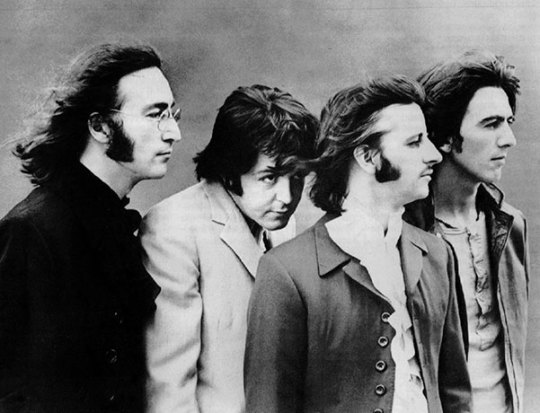
Beatles after the Beatles.

When the Beatles ceased to exist as a united front in 1969, the nations held their breath, waiting to see what the artists would do now, left alone. Yes, the Beatles were significantly more than the sum of the parts, and – being the voice of nature and time – they promptly left. They left together with the magic ray that shed its light on Great Britain in the 60s. As Philip Larkin said
(Philip Arthur Larkin (1922-1985) – British poet, writer and jazz critic.)
"When you get to the top, there's nowhere to go from there except down. But the Beatles couldn't go down."
The magical long-haired kings of the Golden Age became four ordinary people. But the magic of their music has not disappeared.
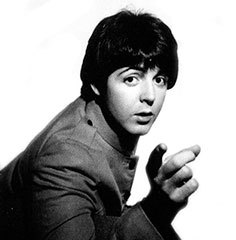
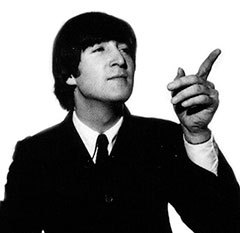
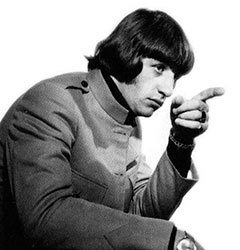

After the breakup of the band in 1969, all four of its members quickly released an album each. Most of all, George Harrison surprised critics – when he was a Beatles guitarist, he always remained a little in the shadows; Lennon and McCartney considered him to be the youngest, did not treat him very seriously and reluctantly put his songs on albums. Having become independent, George turned around with all his might and right in 1969 released as much as a triple album "All Things Must Pass". It has been three years since he became deeply immersed in Indian philosophy, and, being free from the Beatles, he suddenly bloomed like a rose on which the rays of the sun fell. And he began to broadcast this solar energy to all of us.
And his colleagues began to get what they lacked in terms of employment during their service in the long–suffering team.
John Lennon (who, in fact, once founded this band, and then broke it up) Back in 1968, at the London exhibition, he met the Japanese avant-garde artist Yoko Ono, and she taught him the mind. He suddenly realized that besides the Beatles, there are other values in the world, and another art, there is something else, and he went all out, because he never did anything by halves.
Having recorded together with Yoko several sound collages that were not too popular with the people, he assembled a virtual plastic ono Band and recorded a simple and strong album "John Lennon – Plastic Ono Tape".
The song is beautiful. But there are problems with There were a lot of John and Yoko, because the young couple was so desperate to make themselves known that there wasn't a week that they didn't get on the pages of the newspapers with some kind of prank. And very soon the British press hounded them so that they moved to New York. But even there they began to actively participate in all local guerrilla gatherings and were quickly taken under surveillance by local state security agencies. John was locked up in America – if he had left there even for a day, they would not have let him back in.
Well and Paul McCartney, accused by the world of all sins, including the collapse of the Beatles (although he was the one who tried his best to keep the band afloat), around the same time met the girl of his dreams – photographer Linda Eastman.

As opposed to He did not seek to arrange constant happenings with John and Yoko – on the contrary, he even grew a beard in order to walk the streets unnoticed. Linda did not strive for fame either, she offered her fragile shoulder to him and offered to go to the village.

The Maharishi and George
In the village, Paul, furnished with all the instruments (after all, at first he was the lead guitarist of the Beatles, Ringo always resented him for the fact that Paul taught him how to play the drums, he could play the piano since childhood, and as for playing the bass, Jimi Hendrix sincerely called him the best bass player in rock and roll), so: Paul single-handedly recorded an album with the original name "McCartney", praising what he always It was best to sing the praises of home warmth, peace and comfort.

We must give Paul his due: he has talent (as well as John) did not decrease. And although he undoubtedly became much more pop without the help of old friends, from time to time he managed to write masterpieces.
The continuation of the fairy tale follows.....
Part 1📌
#sold out#Beatlemania#book “Balloon. Aeronauts and artifacts - Boris Grebenshchikov”#the beatles#john lennon#paul mccartney#ringo starr#george harrison#liverpool#england#music story#history music#rock#pop#beat#psychedelia#music#my music#music love#musica#rock music#spotify#my spotify#rock photography#hustory photography#Part 1-2📌
12 notes
·
View notes
Text
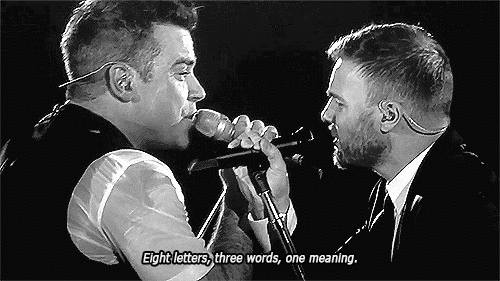
Hey guys, are you like me who is a bit upset that Robbie is not the one who sing Eight Letters in Progress?? Do you wish that there is a decent recording of creamcakes Eight Letters duet??? Worry no more guys for I have created it.
After watching behind the scene of The Beatles' Now and Then, about how they can finally extract John Lennon's vocal of this song demo thanks to AI so now they can finally release this song officially with all Beatles member involved, and then watched a youtuber who explain how did it work and how you can actually do that easily with free source AI, I wanna try doing this.
So, using LALAL.AI, I extract 3 version of Eight Letters ever released. The reason why I picked Eight Letters as experiment other than multiple versions it has also that all versions has same tempo which obviously would make the job easier. The original one from Progress, the live version from Progress Live, and Robbie's cover from Take the Crown. In the midst of tinkering, I also discover you can extract the different instruments from Fadr and so I took the bass and drum from Progress Live, I ended up only use the bass part.
After that, I combine them all in Audacity, which I am most familiar because it's free source and I used to use this software a lot. I use piano from Take the Crown version as the companion with the bass part from Progress live. I use Robbie's vocal from Take the Crown a lot because the sound is clean. It's harder with Gary's vocal because there are a lot of sound editing from the original and backing vocals from Howard and Mark (which I still left behind a little) so most of his vocal actually come from Progress Live. Anyway, after one day of tinkering. Here you go, enjoy.
Anyway, I still hunt for anyone who has the copy of pro shot performance from Take The Crown Live in O2 2012. But it is so hard and I read at that time you have to download that with the code from live DVD you can only get after the show which is now unavailable. Might as well assume that pro shot is extinct unless his management or Rob himself still has it somewhere. Or if anyone who download it at that time would share this online.
I also use their duet as reference in how to divide their voice. It's like imagining how would they do it if they ever release Eight Letters as duet.
Next step is making music video for this. Hehe, I have no idea why I am doing this with so much effort.
youtube
#gary barlow#robbie williams#barlliams#creamcakes#take that#y'know my tt fever is coming back if i do all this tinkering for the sake of fandom who don't even ask for it#Youtube
29 notes
·
View notes
Text
David Cassidy on John
from Could it be forever? -My Story
During that time, I also got to know one of my musical heroes, John Lennon. When he split with Yoko and was with May Pang, I spent some time in LA with him at Elliot Mintz's house and spent a little time chatting with him. We subsequently had dinner together a couple of times. We'd go to the Imperial Gardens so we could be in a private room where no one would bother us.
Later I flew back to New York twice and spent a little time with Yoko. She is very bright and I liked her a lot. I think she was treated unfairly by the media and the public. She provided a real grounding for John and a place to feel safe. She loved him for who she was, not because he was a Beatle. I later found the same thing with my wife, Sue.
[...]
During the last year of Partridge Family, 1974, John continued making the Rock'n'Roll album. I saw Elliot all the time and John and I would pass messages back and forth to each other through him. John came over to my house in Encino on New Year's eve 1974 or 1975, when I had just finished my world tour. Susan Dey was there and I had fallen asleep at around midnight on her lap. Elliot and John showed up and they had been drinking and celebrating. Susan woke me up and said, 'David, I think there is a Beatle in the house.'
After slurring a few words to each other, John and I decided to play some music. So we went to my music room, where I had all my guitars, and we sat on the floor and I began playing the Beatles' song Any Time at All. It was one of my favorites. That and Mr. Moonlight. And John was like, 'Oh, I can't remember that.' He had written hundreds of songs since then. So I sort of re-taught him the chord structure. We sang it together and I did Paul's part. It was like being a Beatle for a moment. I was fulfilling a dream I'd had when I was 13, learning Beatles' songs on my first guitar after seeing them on the Ed Sullivan show. You don't forget some of the first songs you learn.
We started playing rock'n'roll songs, stuff by Chuck Berry like Nadine. John loved all that Chuck Berry stuff and he knew it much better than I did. It didn't sound very good, we were drinking, laughing and just stumbling through it. I played him a song I had just written and he started playing me stuff that he was working on. [...]
I had an interesting relationship with John. I related to him because of his abandonment issues and creativity. He was kind enough to give me inside into what I was about to go through. He'd been there and done that and was in the process of demystifying himself.
Once we were having lunch together, he invited me to come to A&M studios where he was recording the Rock'n'Roll album. He asked me if I wanted to play with the other musicians. I did go but it was so crowded and almost every great guitar player you can think of was there. Harry Nilsson, Cher and lots of other people were there, too. At the time I didn't want to be part of the circus. I only stayed for around 15 minutes, although in hindsight I probably should have played.
John had a fabulous sense of humour. He was more dedicated to the things he believed in than anyone I can think of. He wasn't seduced by greed. We only spoke briefly about Paul and his comments at the time were, 'Yeah, well, you know, that's just Paul.' I think John was deeply hurt by their differences and the fact that their partnership wasn't a partnership. He felt the competition with Paul who would come in with 15 songs and want to record them all. John told me, 'I don't want to be in, you know, "Paul & the Beatles". I don't want to be a sideman for Paul. It's not what I want to do anymore.'
John Lennon had a very strong influence on me by giving me advice on how to start trying to live a normal life again. How do I find a way to walk down the street or go to a restaurant and not be paranoid? We talked a lot about that. There were certain things that I could say to him and he could say to me that no other people on earth could understand except perhaps the other Beatles and Elvis.
11 notes
·
View notes
Text
Today's final Lewisohn weirdness from last Friday's interview- a new narrative: “Stuart was cool.” That was his legacy.
This clip is massively cut down. It was very long. By the way, “the Beatles' look comes from Stuart” is basically true, but the “art school band” bit seems new, and the “Stuart was cool” bit most definitely is.
FRIDAY: “First of all, he was cool. He was cool in a way that they-- that they aspired to.”
TUNE IN p305: Stuart, who had no discernible Liverpool accent, stayed delicate and never grew tall, reaching no more than 5ft 7in. College friend Jon Hague remembers [Stuart] as ‘very skinny, weak and sick looking’ while Rod Murray notes ‘He was often unsteady and wobbly. If someone was going to fall over something, he would.’ ... Tony Carricker, says ‘Stuart was always the most cerebral and intellectual of all of us: I don’t remember him being into rock or having records. I once loaned him about ten 45s and they came back warped – the ultimate sin.’
“Stuart was cool” ❦ Lewisohn last Friday:
ARTE DA BIOGRAFIA - 26 April 2024:
LEWISOHN: The legacy of Stuart Sutcliffe—who died at the age of twenty-one, he was the Beatles' bass player for about eighteen months—uh, is quite strong. Because, uh-- on two fronts. First of all, he was cool. He was cool in a way that they-- that they aspired to. So he gave them-- they were art school. ... The Beatles had an intelligence about them. In particular because John Lennon and Stuart Sutcliffe went to art school. And art school was a different breeding ground entirely.
And the Beatles were an art school band.
So Stuart was arty, that's the first thing. The second thing is when they go to Germany the first time they make three very important friendships. Three young Germans ... They shunned everything that was German and- and grooved to everything that was Paris. ... When they see the Beatles, they fall in love with Stuart, primarily, because he's so cool. Uh, and then they fall in love with the Beatles' generally. ... Their look comes from France, via Germany. And so, it all comes-that all comes through Stuart. If they hadn't have liked Stuart the Beatles' wouldn't have had that look.
----
He sounds so ridiculous it HURTS. 😭
#lewisohn#fine tuning#because he was cool#stuart sutcliffe#new lewisohn narrative just dropped#the beatles were an art school band#grooved to everything paris baby#cringe humor#john lennon#don't try to be cool#dad you're embarrassing me!
13 notes
·
View notes
Text
just insane mclennon things
John playing his and Yoko's sex tape in a band meeting
As the meeting was drawing to a weary close, John, not this day with Yoko, who hadn’t seemed particularly connected with what was going on, said he wanted to play us a tape he and Yoko had made. He got up and put the cassette into the tape machine and stood beside it as we listened.
The soft murmuring voices did not at first signal their purpose. It was a man and a woman but hard to hear, the microphone having been at a distance. I wondered if the lack of clarity was the point. Were we even meant to understand what was going on, was it a kind of artwork where we would not be able to put the voices into a context, and was context important? I felt perhaps this was something John and Yoko were examining. But then, after a few minutes, it became clear. John and Yoko were making love, with endearments, giggles, heavy breathing, both real and satirical, and the occasional more direct sounds of pleasure reaching for climax, all recorded by the faraway microphone. But there was something innocent about it too, as though they were engaged in a sweet serious game.
John clicked the off button and turned again to look toward the table, his eyebrows quizzical above his round glasses, seemingly genuinely curious about what reaction his little tape would elicit.
However often they’d shared small rooms in Hamburg, whatever they knew of each other’s love and sex lives, this tape seemed to have stopped the other three cold. Perhaps it touched a reserve of residual Northern reticence.
After a palpable silence, Paul said, “Well, that’s an interesting one.”
The others muttered something and the meeting was over.
It occured to me as I was walking down the stairs that what we’d heard could have been an expression of 1960s freedom and openness but was it more likely that it was as if a gauntlet had been thrown down? “You need to understand that this is where she and I are now. I don’t want to hold your hand anymore.”
Paul putting beetles fucking on his album artwork
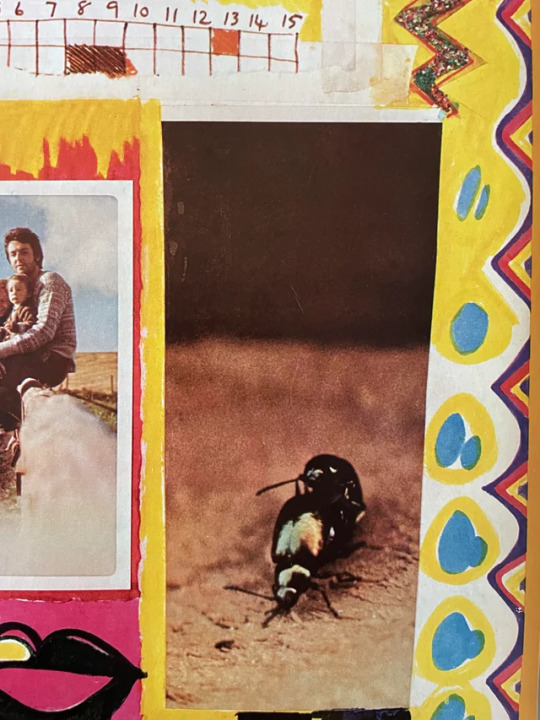
John hiring a pig and posing with it solely to mock Ram even though he was scared of it
At the end of the day a farmer delivered a huge hog to the mansion [Tittenhurst Park]. It was John’s notion to parody the album jacket photograph of Paul McCartney’s Ram, which showed Paul wrestling with a ram; John would wrestle with a pig. We all went outside and stared at the large surly animal. It was much bigger than any of us had expected. John circled the animal warily. He liked the idea, but he didn’t like the hog.
Dan stood poised to snap the picture. “Climb on its back, John, and grab its ears,” he said.
John looked doubtful. He stepped closer to the animal. It let out a shrill, strange, sound. John stepped back, but we all urged him on. “You can do it, John,” I said. John approached the animal once again. “I can’t hold the friggin’ pig for too long. You get one shot and one shot alone,” he told Dan.
Loving John: The Untold Story, May Pang
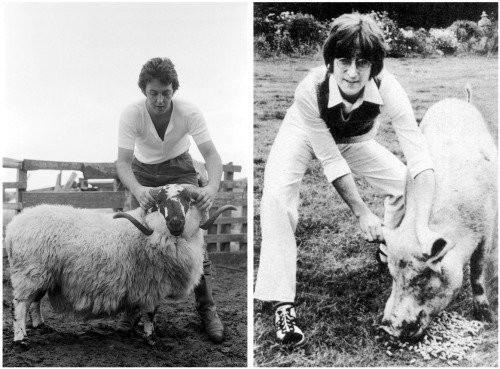
John & Yoko attempting to get revenge married in Paris 2 days after Paul & Linda
“On March 12, Paul married Linda Eastman at Marylebone Register Office in London, amid scenes of hysterical grief from his female fans. None of the other Beatles was present. The news reached John as he and Yoko were driving down to visit Aunt Mimi in Poole. Yoko’s divorce decree had become final a few weeks earlier, and, in a resurgence of Beatle copycat, John told her they, too, must get married as soon as possible”
Philip Norman, John Lennon: The life

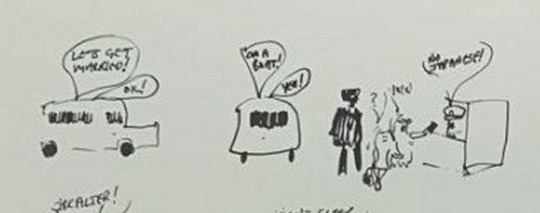
We chose Gibraltar because it is quiet, British and friendly. We tried everywhere else first. I set out to get married on the car ferry and we would have arrived in France married, but they wouldn’t do it. We were no more successful with cruise ships. We tried embassies, but three weeks’ residence in Germany or two weeks’ in France were required.
John Lennon
SALEWICZ: Well, I always found it interesting the fact that he got – I mean, it seemed too much like coincidence to me, the fact that he got married a week or month after you. You know what I mean?
PAUL: Yeah. I think we spurred each other into marriage. I mean, you know. They were very strong together, which left me out of the picture. So I got together with Linda and then we got strong with our own kind of thing. And I used to listen to a lot of what they said. I remember him saying to me, “You’ve got to work at marriage,” which is something I still remember as a bit of advice. I still remember that. Um… And then yeah, I think they were a little bit peeved that we got married first. Probably. In a little way, you know, just minor jealousies. And so they got married. I don’t know if that’s – I mean, who knows… [inaudible] making it up, anyway.
September, 1986 (MPL Communications, London): journalist Chris Salewicz
Their belief in telepathy & shared dreams
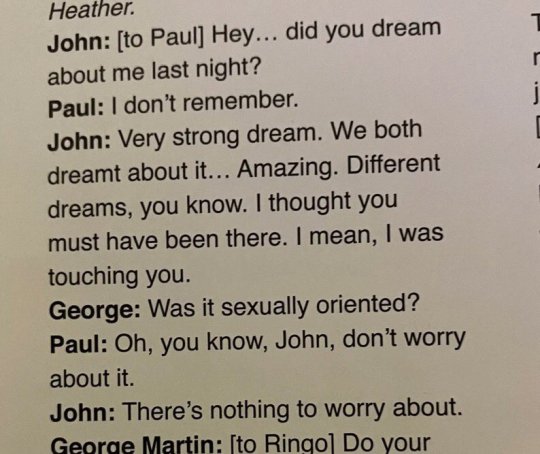
NEIL: I’d just rather not say anything. It’s one of those situations.
PAUL: Yeah. [pause] Well, that’s – that’s the trouble you see, there, ‘cause that’s it. It’s like, with our – heightened awareness, the answer is not to say anything, you know. But it isn’t. ‘Cause I mean, we screw each other up totally if we don’t do that. ‘Cause we’re not ready for your heightened… vows of silence. [laughs; hapless] We’re really not! Like, we don’t know what the fuck each other’s talking about, when that – we all just sort of get—
NEIL: I think it’s just between the four of you, that get it. That’s what I’d pretend.
PAUL: Oh yeah, right, yeah. But you see, that’s it, that’s why John doesn’t say anything. ‘Cause he, you know, he just… There was something the other day, when I said, “Well, what do you think?” And he just stood there and didn’t say anything. And then – and I know exactly why, you know. I mean, I wouldn’t, if… [long pause] Somehow. You know, there’s nothing really much to be said about it. You just – we all just have to do it, and all that, instead of like talking about it. But – but if one of us is talking about it, it’s a drag if the other three aren’t. Because then it sort of throws you off. [inaudible; voice marking tape slate] I mean, we’ve just been talking about it now for a few years, you know. Like this…
From the Get Back sessions (13 January 1969).
HINDLE: What do you think about language?
JOHN: I think it’s a bit crummy, you know? It is a drag form of communication, really. We’ll get – we’ll get telepathy. I believe that.
HINDLE: You believe that?
JOHN: Yeah, sure. Sure. Sure as anything I believe. It’s too… Because now we need it so much. [...] There are – there’s people everywhere of the same mind and it’s just… even amongst ourselves we can’t communicate. Which is the hard bit, you know.
HINDLE: Yeah.
JOHN: Amongst the people that sort of really agree.
HINDLE: Just ’cause of words?
JOHN: Just ’cause of words, and upbringing, and attitude, and how you express your… Well, it’s just some – you’ve got to find a mutual sort of language to express yourself, you know? And my language is that—
HINDLE: Unless you fall in love it’s impossible to communicate like that.
JOHN: I mean, I wasn’t in love last year, but I was communicating quite well with people. Not as well, or maybe not as powerfully. ’Cause now there’s two of us, doing that, brrmmm, whatever it is. Sending out a vibration or whatever. But before it was me and… or me and George, alright, or whatever it was; we weren’t in love, but. You know. There’s enough in you to shove it out. It is just that bit. If you – if somebody comes in a room and he’s uptight and that, he can make the whole room uptight.
John Lennon, interviewed by Maurice Hindle (December 1968).
PAUL: I remember when John and I were first hanging out together, I had a dream about digging in the garden with my hands. I’d dreamt that before but I’d never found anything other than an old tin can. But in this dream I found a gold coin. I kept digging and I found another. And another. The next day I told John about this amazing dream I’d had and he said, ‘That’s funny, I had the same dream’. So both of us had this dream of finding this treasure. And I suppose you could say it came true. I remember years later talking about it – ‘Remember that dream we had?’; ‘Yeah, that was far out’. So the message of that dream was: keep digging lads.
PAUL MCCARTNEY TO THE BIG ISSUE. FEBRUARY 2012.
John climbing the wall to Paul's house because Paul skipped a session for his & Linda's anniversary
(Not confirmed but supposedly)
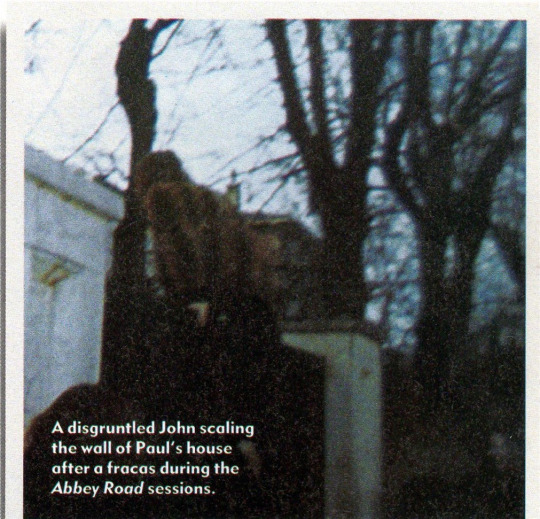
Paul being utterly convinced that John can't be gay because he didn't try it on when they slept in the same bed
I mean, if John was–the trouble is, see, is he’s not here to fend for himself, and we can’t ask him, “‘Scuse me, John, are you–have you ever been gay?” I mean, he’s the kind— I remember people used to ask that. There were lots of people asking cheeky questions, and they were always saying, “Well, why–have you ever tried homosexuality, John?” You know, they always used to ask all that kind of stuff. I remember John saying to them, “No, I’ve never met a fella I fancy enough.” And that was his kind of opinion. You know, “I may go–I may be gay one day, if some fella really turns me on.” He was–he was that open about it. But as far as I was concerned, I slept in a million hotel rooms–as we all did–slept in a million places with John, and there was never any hint of it.
December 24th, 1983: interview with DJ Roger Scott
“And I say, if he’s homosexual, I thought he’d have made a pass at me in 20 years, darling.”
Paul McCartney talking about John Lennon.
“Brian Epstein, the Beatles’ manager, was a known homosexual. Epstein was always polite and charming. It has been insinuated that John was drawn to Epstein. I believe there was no such relationship between them. John was macho. But if John was a homosexual, it would have made no difference to me. I’ve asked Paul McCartney, who laughed and said: ‘Why not me? I’m handsome.’ Then he said: ‘I was holed up with John in hotel rooms everywhere. There was never a suggestion of anything like that.’ I believe him.”
Julia Baird, in Boston Globe: Lennon’s half-sister remembers… (2 October 1988).
“All I can ever say about it is that I slept with John a lot because you had to, you didn’t have more than one bed - and to my knowledge John was never gay.”
Paul McCartney, The Brian Epstein Story
And maybe he's right to be offended?
Did Lennon have sex with other men?
“I think he had a desire to, but I think he was too inhibited,” says Ono.
“No, not inhibited. He said, ‘I don’t mind if there’s an incredibly attractive guy.’ It’s very difficult: They would have to be not just physically attractive, but mentally very advanced too. And you can’t find people like that.”
So did Lennon ever have sex with men?
“No, I don’t think so,” says Ono. “The beginning of the year he was killed, he said to me, ‘I could have done it, but I can’t because I just never found somebody that was that attractive.’ Both John and I were into attractiveness—you know—beauty.”
Yoko Ono: I Still Fear John’s Killer by Tim Teeman for the Daily Beast (13 October 2015).
There was even some discussion, albeit not very serious, of whether he should stick to his own gender. “John said ‘It would hurt you like crazy if I made it with a girl. With a guy, maybe you wouldn’t be hurt, because that’s not competition. But I can’t make it with a guy because I love women too much, and I’d have to fall in love with the guy and I don’t think I can.’”
Yoko on her and John discussing the terms of an open marriage in 1973 (John Lennon: The Life)
On that note, Paul's obsession with sleeping in the same bed as John
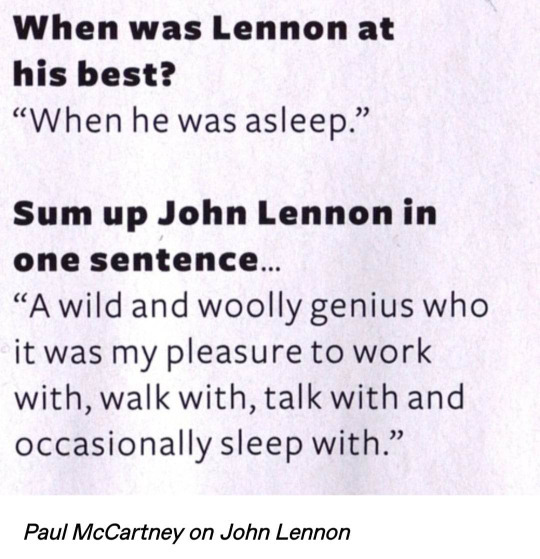

Paul McCartney answers questions for Q magazine, 1998
John and I used to hitch-hike places together, it was something that we did together quite a lot; cementing our friendship, getting to know our feelings, our dreams, our ambitions together. It was a very wonderful period. I look back on it with great fondness. I particularly remember John and I would be squeezed in our little single bed, and Mike Robbins, who was a real nice guy, would come in late at night to say good night to us, switching off the lights as we were all going to bed.
Many Years From Now
John and I always liked wordplay. So, the phrase ‘She’s got a ticket to ride’ of course referred to riding on a bus or train, but – if you really want to know – it also referred to Ryde on the Isle of Wight, where my cousin Betty and her husband Mike were running a pub. That’s what they did; they ran pubs. He ended up as an entertainment manager at a Butlin’s holiday resort. Betty and Mike were very showbiz. It was great fun to visit them, so John and I hitchhiked down to Ryde, and when we wrote the song we were referring to the memory of this trip. It’s very cute now to think of me and John in a little single bed, top and tail, and Betty and Mike coming to tuck us in.
Paul McCartney, on ‘Ticket To Ride’. In The Lyrics (2021).
“John and I grew up like twins although he was a year and a half older than me. We grew up literally in the same bed because when we were on holiday, hitchhiking or whatever, we would share a bed. Or when we were writing songs as kids he’d be in my bedroom or I’d be in his. Or he’d be in my front parlour or I’d be in his, although his Aunt Mimi sometimes kicked us out into the vestibule!”
New Statesman, “Paul McCartney - Meet The Beatle,” September 26, 1997
“I wrote all those songs with him so…. what can I say to people?? We were kids! I mean… we slept together, topped and tailed in beds and hitch-hiking and stuff, so,…. I mean, we were just totally you know,….. mates.”
Paul McCartney
John taking matters into his own hand to start rumours about him and Paul
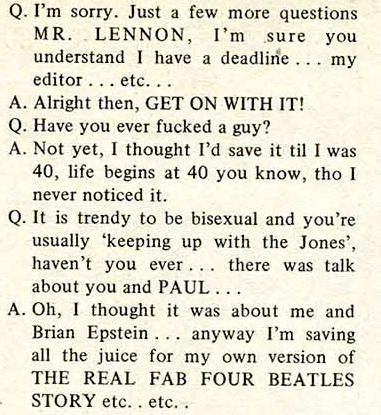
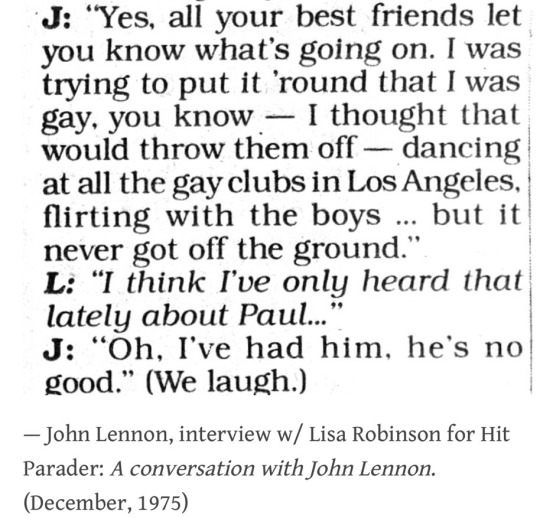
The consensus among John, Paul and Yoko that if J&P could have been together, they would have
“. . . I mean, I think really what it was, really all that happened was that John fell in love. With Yoko. And so, with such a powerful alliance like that, it was difficult for him to still be seeing me. It was as if I was another girlfriend, almost. Our relationship was a strong relationship. And if he was to start a new relationship, he had to put this other one away. And I understood that. I mean, I couldn’t stand in the way of someone who’d fallen in love. You can’t say, “Who’s this?” You can’t really do that. If I was a girl, maybe I could go out and… But you know I mean in this case I just sort of said, right – I mean, I didn’t say anything, but I could see that was the way it was going to go, and that Yoko would be very sort of powerful for him. So um, we all had to get out the way.”
Paul McCartney, interview with German tv program Exclusiv, April 1985.
JOHN: It’s a plus, it’s not a minus. The plus is that your best friend, also, can hold you without… I mean, I’m not a homosexual, or we could have had a homosexual relationship and maybe that would have satisfied it, with working with other male artists. [faltering] An artist – it’s more – it’s much better to be working with another artist of the same energy, and that’s why there’s always been Beatles or Marx Brothers or men, together. Because it’s alright for them to work together or whatever it is. It’s the same except that we sleep together, you know? I mean, not counting love and all the things on the side, just as a working relationship with her, it has all the benefits of working with another male artist and all the joint inspiration, and then we can hold hands too, right?
John Lennon, interview w/ Sandra Shevey. (Mid-June?, 1972)
Y: After the initial embarrassment, that how Paul is being very nice to me, he’s nice and a very, str- on the level, straight, sense, like wherever there’s something like happening at the Apple, he explains to me, as if I should know. And also whenever there’s something like they need a light man, or something like that he asks me if I know of anybody, things like that. And like I can see that he’s just now suddenly changing his attitude, like his being, he’s treating me with respect, not because it’s me, but because I belong to John. I hope that’s what it is because that would be nice. And I feel like he’s my younger brother or something like that. I’m sure that if he had been a woman or something, he would have been a great threat, because there’s something definitely very strong with me, John, and Paul.
Yoko Ono, Revolution Tape, June 4th 1968
"We thought we'd do a number of an old estranged fiancé of mine called Paul.""
youtube
As a second choice from the Lennon- McCartney songbook, Elton suggested 'I Saw Her Standing There'. This appealed to John for its antiquity, and because its lead vocal always was sung by Paul. (...) There was a whisper of Royal Variety Show mischief when he announced "a number by an old estranged fiancé of mine called Paul" - no one yet knowing the estranged fiancés were long reconciled.
John Lennon: The Life, Philip Norman
You know, John loved Paul. No doubt about it. I remember once he said to me, “I’m the only person who’s allowed to say things like that about Paul. I don’t like it when other people do.” He didn’t like if other people said nasty things about Paul. And he always referred to Paul as his estranged fiancé and things like that, like he did on that [live] record ‘I Saw Her Standing There’ with Elton in Madison Square Garden.
1990: Former Beatles publicist Tony King
Married couple signatures
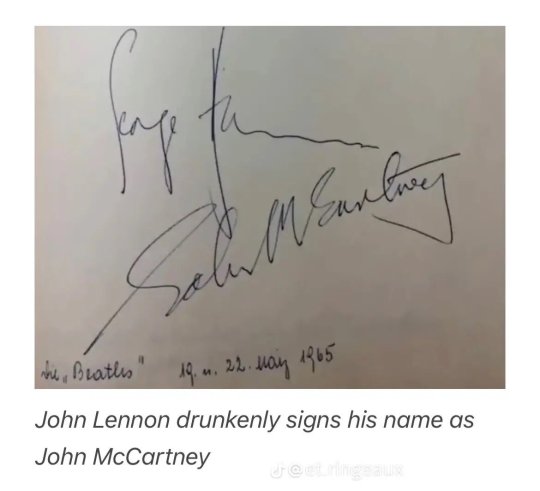
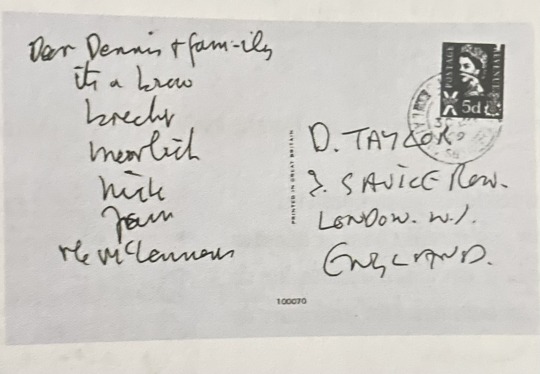
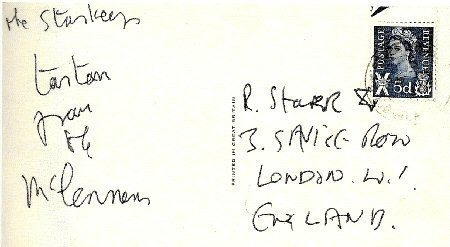
(and the reverse of that postcard...)
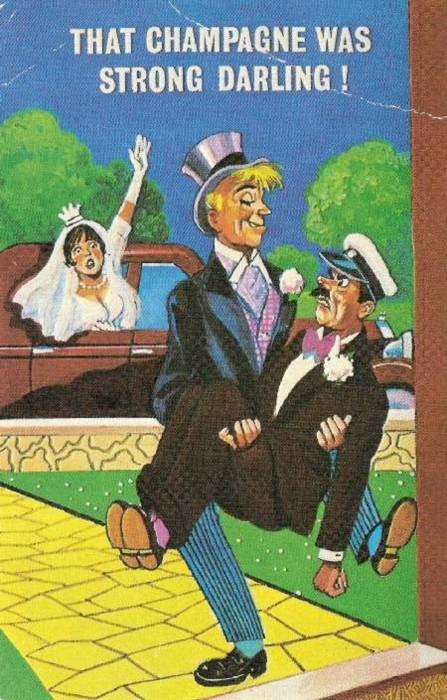
John publicly predicting Paul & Linda's divorce
You were right about New York! I do love it; it's the ONLY PLACE TO BE. (Apart from anything else, they leave you alone too!) I see you prefer Scotland! (MM) -- I'll bet you your piece of Apple you'll be living in New York by 1974 (two years is the usual time it takes you right?)
John's letter to Paul in Melody Maker, 1971
Finally, about not telling anyone that I left the Beatles—PAUL and Klein both spent the day persuading me it was better not to say anything—asking me not to say anything because it would 'hurt the Beatles'—and 'let's just let it petre out'—remember? So get that into your petty little perversion of a mind, Mrs. McCartney—the cunts asked me to keep quiet about it. Of course, the money angle is important—to all of us—especially after all the petty shit that came from your insane family/in laws—and GOD HELP YOU OUT, PAUL—see you in two years—I reckon you'll be out then—inspite of it all, love to you both, from us two.
John's personal letter to Linda & Paul, 1971
JOHN: Oh, [Klein]’d love it if Paul would come back. I think he was hoping he would for years and years. He thought that if he did something, to show Paul that he could do it, Paul would come around. But no chance. I mean, I want him to come out of it, too, you know. He will one day. I give him five years, I’ve said that. In five years he’ll wake up.
YOKO: And people don’t understand, you know. There’s so many groups that constantly announce they’re going to split, they’re going to split, and they can announce it every year, and it doesn’t mean they’re going to split. But people don’t understand what an extraordinary position the Beatles are in, you know. In every way. They’re in such an extraordinary position that they’re more insecure than other people. And so Klein thinks he’ll give Paul two years Linda-wise, you know. And John said, “No, Paul treasures things like children, things like that. It will be longer.” And of course, John was right.
John Lennon and Yoko Ono, interview w/ Peter McCabe and Robert Schonfeld. (September, 1971)
#the beatles#paul mccartney#john lennon#mclennon#only a tiny fraction of insane things#they have such chaotic lore
246 notes
·
View notes
Text
How did Paul react to John's rejection with songs?
Whether or not traditional Beatles scholars like it, John and Paul didn’t lose their bond in 1968. Their emotions were still hot, albeit more complex, and they reacted to each other. And since they were musicians, the best way was to write songs. John reacting to Paul's behavior with songs is a known case (see: I'm so tired, Jealous guy, Instant Karma ect.). However, little is said about the fact that Paul also responded with music to John's behavior. Today I wanted to focus on how McCartney reacted to Lennon's rejection (not always romantic) because that seems particularly interesting to me.
JUNK
It had been perfectly described by Better than looking at the mirror HERE. Let's look at the 1968 Lennon/McCartney timeline: Mid-February - The Beatles arrive in India. 26th March - Paul leaves. 12th April - John leaves. After that, he's absolutely mentally devastated and overuses drugs. Certainly, there are a lot of reasons for that, the most important being John's mental disorders which are not treated properly. But also, his relationship with Paul seems to be a significant factor. Something wrong happened between them in India. There are quite a few theories. The most popular is Lennon declaring his romantic and/or sexual affection to Paul and Paul rejecting him (and in a way, John himself suggested erotic tension between them). I think it's possible and I name the second thing: Paul leaving India so early. John was in a terrible mental state, he even wanted to kill himself. And most likely McCartney didn't support him, which left Lennon heartbroken and dissapointed (perfectly valid). However, we are also uncertain whether John made it clear to Paul that he needed help. Probably not, because he believed he and Paul were telepathically connected and knew all about each other.
May 11th to May 16th - John and Paul are in New York to promote the Beatles new company, Apple. There are a lot of audio and video footage of them: they gave the interview to US press on 13th May, they appear on Tonight Show, on Apple press conference, and gave the radio interview to Mitchelle Krause which was later aired on the program „Newsfront” (all 4 meetings happened on May 14th). IMO the negative tension between Lennon and McCartney in palpable. John in frustrated and annoyed and Paul seems evasive and like knowing he somehow fucked up. What's more, on the radio interview John seems to be giving a hint about "forbidden love" for which the public is not ready, and we can hear Paul feeling uncomfortable about it. During their stay McCartney meets Linda Eastman, a photographer he talked a year earlier with. On the final day, he invites Linda to go with him and John to the airport. She does it and takes a few photos of them. John later (in 1970) expressed he felt very uncomfortable with Linda's presence.
May 19th - depressed John consumes LSD, has a bad trip and gets together with Yoko (who helps him to "rebuild his ego"): they spend their first night in John's house and record their first avantgarde album. 3 days later they make their 1st public appearance as a couple. 30th is the 1st day of White Album sessions. And it this gap between 16th and 30th May Paul completed "Junk" (which can be heard on Esher demos). As Paul said about the lyrics: "Sounds like one lover saying “bye, bye” and the other plaintively asking “why, why”, even as the junk in the yard demands an explanation for the urge to acquire something – or somebody – new". It's easy to see that Macca was putting his current emotions into a song. With John commiting to a new lover - who he valued so high that they appear publicly, despite having a wife - Paul might feel like a discarded "Junk" and expressed it. I'm not saying it was the only reason for his low frame of mind at the time but clearly one of the most important.
GOODBYE (here's the official version)
The track, written by Paul and performed by Mary Hopkin, was released at March 28th, 1969. As we can read on Wikipedia, "[the song] was written in a great hurry to capitalise on Hopkin's popularity". It means that Paul wrote in probably in March 1969. And you know what also happened in March 1969? Lennon and McCartney's weddings. Paul and Linda got married at March 12th and John and Yoko at March 20th. If someone read Paul's feeling towards John as purely platonic, they would think that Macca started a new family and it had nothing to do with Lennon. But that's not my opinion. And it's not a coincidence that John decided to got married right after Paul (he organised wedding in a hurry). Both men ended the month with a thought: "We have new life partners now". I'm not implying John and Paul were physical lovers (I don't exclude that option tho) but there certainly was some romantic tension and a hope to push their relationship further, at least from John's side, and I suppose partially from Paul's (sometimes I think differently, let's leave that lol). But it didn't happen. So McCartney is writing a farewell song. "Goodbye, my love, goodbye". I linked a demo of this tune, performed by Paul, and it's interesting to hear him singing: "Far away my lover sings a lonely song and calls me to his side".
DEAR FRIEND and LITTLE LAMB DRAGONFLY
In December 1970 John gave an interview to „Rolling Stone” journalist Jan Wenner; the interview later appeared as the book "Lennon Remembers". John spoke in an unpleasant, even brutal way. It’s worth noting that he was then under the influence of Arthur Janov's primal scream therapy. Janov was a homophobe and John took over his language, insulting with homophobic terms e.g. Mick Jagger and Brian Epstein. What’s more, John harshly criticizes Paul and the Beatles (calling them a „myth”). He says that Paul’s first solo album is „rubbish” and claims that McCartney during Beatle years was a conformist and cared only about the commercial side of songs. Lennon’s complaints are also about Paul being controlling and egoistic.
We can imagine how hurt Paul felt after reading this interview. He was judged very severely: his flaws were exaggerated, and his contribution to the development of the Beatles (e.g. interesting John in the avant-garde or the use of tape loops on "Tomorrow Never Knows") was not even mentioned. It must have been terrible wound and massive rejection of his talent and creativity.
Paul, as usual, poured his emotions into songs. In response to John's poisonous comments, he wrote „Dear Friend”. It’s likely he also wrote "Little Lamb Dragonfly" at the same time (late 1970). Interestingly, Paul decides not to attack Lennon.
In „Dear Friend”, he tries to approach him with understanding. As John's closest friend for many years, Paul knows his insecurities perfectly. He asks: „Are you afraid, or is it true?”. The most interesting line is: „Dear friend, throw the wine, I’m in love with a friend of mine”. It is very puzzling and unclear. Why does Paul use the word "friend" two more times? Maybe he assures John that he is still in love with him? Or maybe there are two friends – John („Dear friend, throw the wine”) and Linda („I’m in love with a friend of mine”)? If the latter interpretation is true, Paul is delicately trying to reassure John that he genuinely loves Linda and his family, so he’s not going to abandon them for John, but they can still be friends. Maybe this is: "We are both happily married and we can maintain platonic relationship”?
IMO "Little Lamb Dragonfly" has darker lyrics and expresses disappointment. „I have no answer to you, little lamb, I can help you out, but I cannot help you in”. Paul sees John as trapped by his negative emotions. As long as he doesn't want to change his attitude, no one else will help him. However, Paul admits that he loves John: „My heart is breaking for you, little lamb”; „Since you’ve gone, I never know, I go on, but I miss you so”. What’s more, McCartney still hopes he and his best friend can reconnect: „You and I still have a way to go”. But for that to happen, both sides have to want it!
„Dear Friend” was released on „Wild Life” album in December 1971. Probably the song influenced John's feelings. Later that month, Paul, Linda, John and Yoko met and agreed that they would no longer argue in public. "Little Lamb Dragonfly" appeared on "Red Rose Speedway" album in April 1973. And that time, John and Paul had a good relationship again.
CALL ME BACK AGAIN
It’s a well-known fact that during „Lost weekend” (John and Yoko’s separation, which covered 18 months between 1973 and 1975) John and Paul re-developed their friendship. They had a jam session in March 1974. Lennon even seriously considered writing songs again with his former partner. Paul also missed his best friend. When John, May Pang, Paul and Linda met in New York in 1975, Macca revealed they are going to New Orleans to record. „We’d like to meet us there”, he told Lennon. John, of course, wanted to go there. He was very excited and wrote the song "Howling at the Moon". Unfortunately, before John and Paul could reconnect, Yoko called and told her husband he could go home now.
It’s obvious that „Call me back again” – a song which appeared on 1975 Wings „Venus and Mars” album – is about that situation. Paul recalls growing up together with John. "Well when I, when I was just a little baby boy / Every night I would call, your number brought me joy" - quite an obvious reference to the teenage years, when John and Paul spent every free moment with each other and loved to talk to each other.
But this song is not nostalgic nor joyful. It expresses desperation and pain.
"I called your house, every night since then / But I ain't never, no no never heard you calling me" - probably a reference to the fact that Yoko was controlling John's contacts with his friends and whenever Paul, Mick Jagger or some other acquaintance tried to contact John by phone, she lied that her husband couldn't come over now. And then, of course, she didn't say anything to him.
"Come on and call me / Ooh boo boo boo babe" - Paul missed John so much! At some concerts, Paul would quietly pronounce his name during the song.
Interestingly, "Call me back again" contains a mellotron that sounds like flutes. Maybe Paul is referring to „Strawberry Fields Forever” intro here???
I know I have only touched on the topic a bit here. I’m aware I have very briefly described the Lennon-McCartney dynamics. Treat this post as a stimulus to your own research! <3
#mclennon#analysis#speculation#essay#the beatles#john lennon#paul mccartney#lennon mccartney#romantic friendship#friendship#kinship#queerplatonic relationship#queer love#love is love#mary hopkin#wings#yoko ono#linda eastman#all these songs are amazing tbh
116 notes
·
View notes
Text
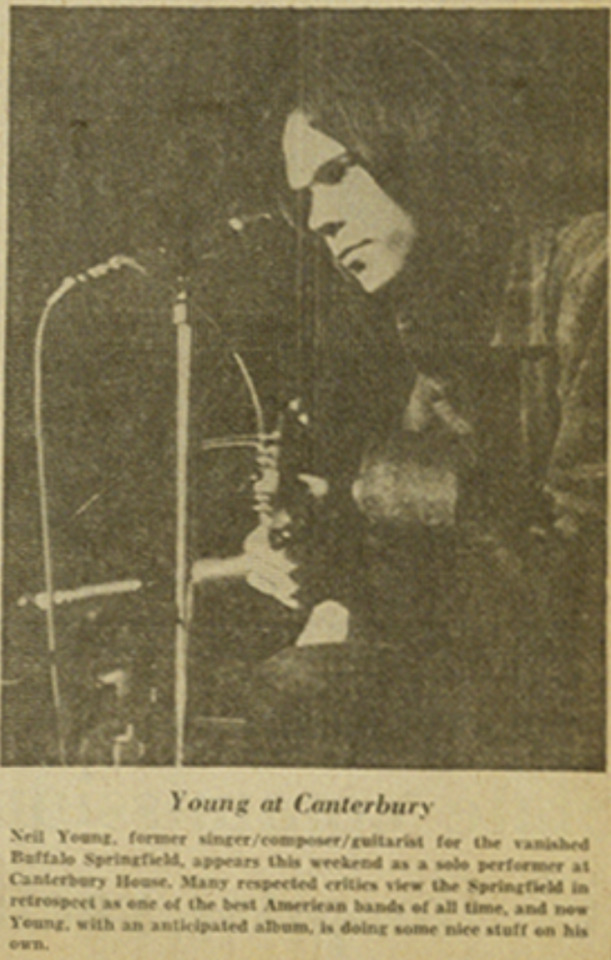
Young at Canterbury
>> by John Gray for The Michigan Daily, 09 November 1968
"Neil Young, former singer/composer/guitarist for the vanished Buffalo Springfield, appears this weekend as a solo performer at Canterbury House. Many respected critics view the Springfield in retrospect as one of the best American bands of all time, and now Young, with an anticipated album, is doing some nice stuff on his own.
In case you didn’t know it yet, the Buffalo Springfield made two of the most beautiful albums ever produced before they broke up this year. They’re both on Atco, and they’re called Buffalo Springfield Again and Last Time Around.
The Springfield was an amazing group – all of the members were (are) superbly talented musicians, and they all worked together, submerging themselves into their songs, blending their talent into something more than the total of their individual performances. Most groups are dominated by one or two lead men who make it or break it – like Morrison’s Doors or Lennon and McCartney’s Beatles. Every once in a while, a group comes along that’s all good but the members just can’t work together right – like the Blues Project or the experimental band on Super Session. It takes just the right people in the right combination, and the Springfield had it.
Neil Young was a standout in the Springfield. He wrote, sang, and produced some of their best songs. And now, like the other members of the group, he’s finding himself as a single, discovering and pointing out his strengths – and weaknesses.
Young is at the Canterbury House tonight, and if you haven’t seen him yet, you should try to catch the show. He’s doing songs off the Springfield albums and off his own as-yet-unreleased album with nothing backing him up but his acoustic guitar.
It’s a strong temptation to say that he made a mistake going out on his own (this is his first gig). He sounds so alone – his voice doesn’t seem to be made for solo performance. You get the feeling that you’re listening to a stereo album with one speaker disconnected. You wanted the bass and drums, you can almost feel the song calling out for a background, a bridge that can’t be made on an acoustic guitar.
But at the same time there’s a very elusive quality to Young’s work that gets lost in a background, that surprises you when you get used to him enough to really feel for it. He’s somehow very close, very real – his imperfection, like Dylan’s adds to his brilliance, but in a different way. Young seems innocent, questioning, and his songs strain with his voice, never quite attaining the brilliance that you know is in them, but suggesting and outlining it so well that it doesn’t really matter.
Young is at his best on his simplest songs, notably “I Am a Child” off Last Time Around. But even on this, the feeling that there’s something missing, something that would make it perfect, remains. Maybe it’s just that he isn’t used to solo performing and hasn’t ironed out his act enough, or maybe it really is a quality of his music that it needs a complex interpretation to counterpoint the melodic brilliance.
Young is a recording artist, and his album, created with a backup in the familiar studio atmosphere, promises to be an event. But it’s fulfilling, it’s nice, to listen to him in person, to hear the musical sketch (not a rough draft, but a study) working itself out in front of you.
#i typed up this whole thing cause it's hard to read but it's interesting anyway#Neil Young#Buffalo Springfield
13 notes
·
View notes